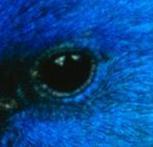Crescent Dragonwagon's Blog
January 7, 2013
getting good at it: the three secrets of writing (and pretty much everything else)
Bonnie Raitt? Yo-Yo Ma? John Coltrane? Lady Gaga? Eric Clapton? Youssou N'Dour? Dolly Parton, Mirian McPartland, Wynston Marsalis, Howlin' Wolf, Luciano Pavarotti, Biggie Smalls?
Doesn't matter. She, or he, does, or did, three things.
Practice. Rehearse. Perform.
Practicing
Practice is just playing around. "Just!" It's getting familiar, comfortable with your instument, whether it's your voice or the dobro. It's having fun, even if on a particular day it's not all that much fun. It's experimenting. And it doesn't have an intended specific outcome. It's just how a muscian says to his or her instrument --- or, if you like, to his or her muse --- "You matter to me. I want to hang out with you. And I want to do that just because. Just because I love you. Because I like you. Because you interest me deeply. Because every time I do, even and especially when I think I don't want to, you never, ever fail to show me something."
Rehearsing
Rehearsing? It's almost the same as practice, but with two gigantic differences. The first is, rehearsal has a specific intended outcome. Yeah, there's an element of fooling around, experimentation, and learning, always, but hey --- we're here to decide which songs are going to be in the second set or the next recording. And once we do, we're here to do them over and over again, in different ways. Until we decide on the way that sounds best to us. Thus the second difference: rehearsal is always, at a certain point, repetitive. When we decide on the direction we're going, on what sounds best, we're gonna do the songs that way over and over again, until it's as perfect as we can get it. All while knowing that perfect is an illusion.
Performing
And performance? That's where we show the world what we've done. Everyone won't like it, of course, but we know we've given it our best shot. And those who do like it will really, really like it. And the odds are good that the back-story of our efforts --- the practice, the rehearsals --- won't show a bit. It'll look effortless. (If the effort shows, the musician didn't practice and/or rehearse enough).
And --- here's the most amazing part --- all that work and effort and anxiety will fall away at the moment of performance. Because the performer, too, will be absent. Because he, or she, as an individual, as that person who worked, got bored, got anxious, got tired, didn't know if it would work out, questioned whether it was worth it --- that person is gone. There is just the music. Both the musician and the audience leave the concert hall or stadium transported, intoxicated. "That," we say, when we finally have words again, "was a great show."
Writing practice
I practice writing every day. Yes, absolutely pointlessly. I can show you the cupboard of notebooks kept on and off since I was sixteen (I'm 60 now, and these days there is no "off"; practice is always on, every single day).
Sometimes I "freewrite." Sometimes I do an acrostic (never with just a single word per line, however). Sometimes I make lists (views I remember from various windows; interactions with birds; things I have lost; beliefs I used to have).
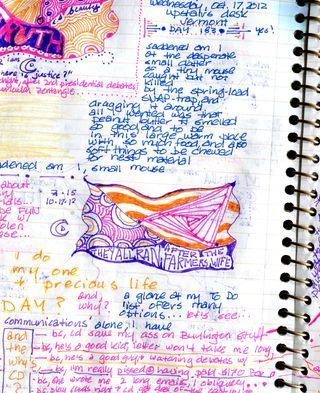 Sometimes I write haiku. Sometimes I do my practice at home; sometimes I take my notebook and little bag of pens to a cafe and work/play there. Sometimes I use a lot of jazzy colors, or doodle and sketch or Zentangle along with or in and out of the words. And I almost never read over what I've done. It's not for that. It's for the doing. It's the way I prostrate, daily, resting my head on the sacred feet of creation, taking refuge in something much bigger than I can understand but in which I trust, perhaps more completely than any other force in the world.
Sometimes I write haiku. Sometimes I do my practice at home; sometimes I take my notebook and little bag of pens to a cafe and work/play there. Sometimes I use a lot of jazzy colors, or doodle and sketch or Zentangle along with or in and out of the words. And I almost never read over what I've done. It's not for that. It's for the doing. It's the way I prostrate, daily, resting my head on the sacred feet of creation, taking refuge in something much bigger than I can understand but in which I trust, perhaps more completely than any other force in the world. Writing rehearsal
Most days I also "rehearse." I consider a first draft of anything I intend or hope to publish "rehearsal". Ditto, second draft. And third. And fourth. And more.
And then, there are all the drafts in response to others' responses to the prior rehearsals. I usually don't show what I'm working on until I've been over it quite a few times myself, and when I do show, especially at the beginning, I am very selective about whom I show it to. I want to know where whatever it is works and where it doesn't, but I'm aware that it, and I, may still be pretty tender. If I and the piece I am writing were a garden of enthusiastic seedlings, I don't want to be stomped on, I want to be thinned, weeded, maybe, and fertilized.
The writer's cast of producer/directors
Usually my partner is the first to hear or read what I've been rehearsing. In the old days, I used to often show these tender, just barely rehearsed starts to my mother, the writer/editor Charlotte Zolotow (at 97, she is far, far past this role).
Sometimes, it's the Second Saturday works-in-progress writing group I facilitate. ("Facilitate" as a verb sets my teeth on edge, but I don't have a better one. So far.).
Somewhere in here, my beloved agent takes a look. Though she is tough --- I have to be sure the work I show her, and my relationship to it, is sturdy enough to bounce back should it get a stomp or two from her. But she, my agent, is good. I don't always like what she says, but I usually wind up agreeing with it, and I never doubt that she wants what's best for the piece of writing.
Rehearsal for publication
If and when a particular piece of writing has been accepted for publication, a whole new round of rehearsal begins. This is the kind of writing called "revisions."
Some writers love this part. Some hate it. Me, at times, both.
Revisions-as-rehearsals are not as scary as those private first draft rehearsals, where one is usually making stuff up out of the most vaguely felt and pieced-together mash-up of ideas, hopes, experiences, and imagined stuff. Not as scary, but not as exhilarating.
The quality of revisions-as-rehearsals depends greatly on the editor.
A good editor pulls from you that which you have not quite said. She or he finds the soft punky spots, where the reader's foot would go right through the floor: where the writer has written inaccurately, or lazily, or without specificity, or untruthfully.
A good editor may make you wince, but his or her comments will also make you think. Spade over what you've done. Aerate your ideas. You read the editor's comments, he or she takes you out to lunch, and suddenly you get excited again. You say, "Yeah, unh-hunh, now I get it. I think. Sort of. Maybe! Let me get in there and see..." A good editor gets you wanting to go back to work. Your same-old piece, that you've been hanging out with so long, is suddenly fresh and eager, and calling to you, yelling to you, standing by the door stamping its feet, saying, "Let's go, let's go!"
A bad editor? A bad editor is a necessary evil: necessary only because every book gets assigned an editor, and she or he is the gatekeeper to publication. and if you want to get published, you have an editor, sometimes a bad editor.
Some bad editors are just plain dumb. They make you do extra work that does not make sense to you; that is unreasonable, that doesn't serve the book, that goes against what you are trying to say. And some bad editors are on an ego trip. It's power, it's I-know-better-than-you-the-writer (and oh how tempting, and foolish, it is to respond on the same level).
Whether benignly dumb or on an ego trip, here's what interactions with bad editors are not, and what they should be, and are with a good editor: how can these two diverse minds and sensibilities, those of the writer and those of the editor, work together, with discernment and respect, to co-create the best possible book/performance?
If you got saddled with a bad editor and you want to get published, you go along with as much as you can stomach. You try to do the absolute best you can with his or her less-dumb comments. You try not to sink to their level. You pick your battles; some things, you realize, you cannot "go along to get along" on. And if you don't do it too often, sometimes you, the writer, can just say, "No," to the editor (and oh how you wish they had been the kind of editor to whom a "Yes!" could have been uttered truthfully and with enthusiasm).
And you can also say the largest "No" and buy back your contract, and look for and hopefully find another publisher, with an editor who, though she or he may make you work your ass off, makes every rehearsal of the book, every rewrite, count. For a hard editor is not a bad editor. Unless she, or he, is.
I've had a few superb editors, a lot of so-so, somewhat competent ones (they improved the books in some ways, but in others did not, and wasted a lot of my time). And I've had a couple who sucked. And I've bought back contracts a couple of times. And/or, when it came time for the next book, "divorced" publishers who saddled me with bad editors.
Writing well, like playing music well, is a lot of work. Why do we --- writers, musicians --- do it, then?
Performance... and practice
Because sometimes a reader closes a book and sighs with pleasure. Says, in effect, "That was a really great show."
But you know what? I can't, in my heart of hearts, say I write to cause this reaction. I love having this reaction as a reader... but if I set out consciously to try to create it as a writer, if I wrote because I wanted to astonish readers, I would freak myself right out of writing a word.
That words which I've written do, sometimes, give something big to my readers: that's extra. That's gravy. I'm delighted. I'm humbled. I'm pleased. And in my heart's core, each and every time I get this reaction, even as I may be saying politely and truthfully, "Thank you so much," I swear to you that inside myself I am prostrating, resting my forehead on the sweet, beloved feet of creation itself, mysterious, strange and compelling.
Unlike a musician's transcendent "great show" moment, we writers have our instances where we are emptied out (in the best possible way), transported, intoxicated in the act of writing itself, not performing as such. Not every day, not every time. But sometimes while practicing and sometimes while rehearsing, it comes.
And so I return to practice. I say to my writing, "You matter to me. I want to hang out with you. Because I love you. Because I like you. Because you
interest me deeply. Because every time I do spend time with you, even and especially when I
think I don't want to, you never, ever fail to show me something."
Because nothing is wasted on the writer.
December 18, 2012
speaking the unspeakable; accepting the unacceptable
Once a month most months,I make the roundtrip drive from Westminster West,Vermont to Hastings-on-Hudson, New York (where I spend a week with my 97-year-old mother, Charlotte Zolotow). Leave Vermont, cross Massachusetts, cross Connecticut, reach New York. And then reverse it. Exit after exit, I read the names of the towns and have my semi-mindless associations with them. Chappaqua, New York; Hillary and Bill Clinton, who have a home there; Pleasantville, New York, my late Aunt Dot's late long-time companion, Jim, who had a home there; Elmsford, New York; that Persian restaurant I like.
Last Thursday, December 13, 2012, I was coming up 84 to Hartford, had almost reached the point in the tangle of lanes where I knew I needed to get to the right to pick up 91 North. Had passed the Connecticut exits with their associations: Waterbury, where I once got fuel, drove off without removing my wallet from where it was resting on the car, and, miraculously, someone turned it in to the local police and I was able to pick it up intact from them. Newtown; I once stopped at an "easy-on easy-off" diner there late at night and had some really not-good lemon meringue pie. Meriden; that's where Ken, who I dated briefly, used to live.
Usually I drive our late model Subaru Forester, but occasionally I drive the crap car: a 2001 Dodge Neon, so low-end that it actually has roll-up (with a crank) windows. I was driving the crap car on Thursday.
It was almost rush-hour as I approached Hartford, a time/place continuum I try hard to avoid on this commute. There was more traffic than I prefer, but I'd still be on the other side of Hartford before it hit full spate. I changed lanes to position myself for the split to 91 North, braking slightly.
And
suddenly
I had
no
brakes
at all.
I considered for maybe 3 seconds trying to pull
off on the nearest ramp and get to a service station. Then in far less
time than it takes to write this account, I ran through the impossible odds of being able to end up at a service station without hitting anyone or anything, off an unknown exit, near rush hour, in downtown Hartford. I realized, "NO."
I was in the right lane. I pulled off onto the shoulder --- narrow, but wide enough --- and glided to a stop. Safely.
I put on the flashers. I called
David. I called AAA. I got right through to Roadside Assistance; they took my position seriously. "We're
putting you on the top of the list."I called another friend. I sat in my car and waited for the tow-truck. I was not yet shaking at my close call, though the car shook with each 18-wheeler that passed. I was relatively still, against the loud white noise of the non-stop traffic stream. I simply couldn't believe I was fine. Alive, unhurt, had not hurt anyone else, had not even dented the crap car. And I was overwhelmed by gratitude and amazement.
The rest of the story --- how I got home, the nice guys at Cameron's Auto Service, David picking up the repaired crap car --- does not really matter.
What matters is, there I was, swimming --- that day and the next --- in astonished gratitude that my life had been spared in Hartford, Connecticut, when I heard the news of the massacre in Newtown. Many other lives, twenty of them the lives of six- and seven-year-olds, had not been spared.
I can make no sense of any of this, on any level. While Rilke advises us to "be patient towards all that is unanswered in your heart, and learn to love the questions themselves," there are some questions, the most profound and fundamental "why" questions, which are simply not lovable and towards which we cannot and perhaps should not and must not be patient.
On one level, the "why" in the case of this slaughter must be addressed. Guns, and the culture of violence so prevalent and glorified in America. Guns and their licensing, or lack of same: I just don't GET why you have to take a test
(not only written but in an actual vehicle, with a policeman no less),
to get a drivers license; then document, tag and title, at each and every point of sale for a car, which is a transportation machine (though it can certainly kill you) but not for a gun, which is a killing machine (though it cannot transport you anywhere, except, possibly, to the next world). Mental health care, and access to it. Causal factors in mental health, including funding cuts not only to clinics and veteran's hospitals, but to programs like Head Start; nutrition and the prevalence of fast food and its effects on mental and emotional state, violence and abuse in the home, and education.
Lord knows these "whys" are complex enough, and faceted, and interrelated. That's the great lesson of ecology: everything affects everything else. As conservationist John Muir famously said, "Pull any thread in nature and the whole unravels." Humans are part of nature. Pull the thread of a human action, sacred or profane, horrific or heroic, and our understanding begins to unravel, deepen, and grow forever more unanswerably perplexing... and "there but for fortune go I."
But even if we could address these sorts of "whys" in the case of this massacre, even if we could alter the legislative and behavioral factors that led to Newtown --- which will now forever bear the crosses of the murdered innocents, which will now forever twist the hearts of even those who casually pass the green and white sign announcing its exit off 84 --- the bigger why remains.
Why are some saved and some lost?
And this is the one that can never, ever even provisionally be answered. (Unless you are Mike Huckabee, who has explained that what happened in Sandy Hook is due to prayer having been 'removed' from our schools.) Wipe out school violence tomorrow, and you are still left with the families who lost their children, who must live forever in an 'after' they had no idea was coming when they got up that morning, made French toast, bundled small arms into sweaters, lifted small back-packs onto small, dear shoulders. The waves of grief spread out and out forever. The circles of grief never stop widening.
I just don't get how our wonderful, gorgeous, one and only world can be so chockablock with hate, evil, ignorance, violence. But, how can anyone get it? It is ungettable.
That being so, what do we do with such events?
I think the trick --- one I so have not come anything
close to mastering --- is to stay permeable to the world in all its
agony and beauty.
Permeable, responsive on a practical level whenever
and however we can... and yet "immunized emotionally" to the extent that
we don't wholly lose our equipoise no matter what.
And when we lose it, as we will, as we must, as we should, in response to things like the deaths at Sandy Hook... Well, I used to have a yoga teacher who would say, on the tricky balance poses as half the class was falling over, "Let your coming and out of the pose be part of the pose."
I think it has to be like that. When we inevitably, and often properly, lose our equipoise, we let that --- that sorrow, that lack of balance --- "be part of the pose." And
return to the reaching for balance. Not achieving it; just reaching for it.
Not blocking out the
world; yet neither so losing ourselves in its infinite painful and
horrific 24/7 news cycle, the endless stories, both new and repeated, that we are flattened and incapacitated.
Not easy. But the alternatives (being flattened by pain or hardening one's heart to it, becoming impermeable) are worse.
My own brush with mortality the day before filled me with gratitude; the news of the innocents' deaths, so nearby, the following day, with heaviness, despair. Yet in one sense both tell the same story: that our lives are on loan to us, and may be recalled at any time. That the veil between life and death may be opaque, but is paper-thin. That, in the end, we must make our lives worthy of the privilege of having been given this precious loan. That we must stay permeable and balanced, the better to do whatever work has our name on it. That this work should be generous --- as generous as the giver of that mysterious gift of our individual loaned lives as been to us.
And the 'what does one do with such events' question takes on another dimension if we are writers. We must write about this, however imperfectly and inadequately. We must try to speak the unspeakble.
It is the tiniest of ways we can not let those small bright lives have been wasted.
This poem comes from her View With a Grain of Sand, translated
Stanislaw Baranczak and Clare Cavanagh (New York: Harcourt, Brace,
1996)
It could have happened.
It had to happen.
It happened earlier. Later.
Nearer. Farther off.
It happened, but not to you.
You were saved because you were the first.
You were saved because you were the last.
Alone. With others.
On the right. The left.
Because it was raining. Because of the shade.
Because the day was sunny.
You were in luck -- there was a forest.
You were in luck -- there were no trees.
You were in luck -- a rake, a hook, a beam, a brake,
A jamb, a turn, a quarter-inch, an instant . . .
So you're here? Still dizzy from
another dodge, close shave, reprieve?
One hole in the net and you slipped through?
I couldn't be more shocked or
speechless.
Listen,
how your heart pounds inside me.
July 30, 2012
Have I missed anything?
I had no idea Nate was an undercover cop in the Narcotics Division of the Chicago police department the first time I slept with him. I will skip the whole long, weird tale of his and my relationship, which only lasted 5 or 6 months, and took place when I was around 23 years old, other than to mention that my not knowing this essential fact was due both to the general social-and-mating practices of the period (early 1970's) and the circumstances under which we met (picked each other up at a now long-defunct bar called The Quiet Night, in Eureka Springs, Arkansas, where I then resided and to which he had come on vacation).
Fast-forward to maybe 3 or 4 months into our relationship, which was a major crush, and of course, very exotic to both of us. No email then, but we managed daily or near-daily phone-calls, notes by mail, and his not infrequent visits to Eureka Springs. I think I'd visited him in Chicago maybe twice before I got the call. I remember my hand flew to my mouth and I literally dropped the phone, and had to pick it back up again from the floor onto which it had clattered, for after I had replied in the affirmative to "Is this Crescent Dragonwagon? " what I heard was "I'm a friend of Nate's. Now, it wasn't fatal, but Nate was stabbed in the middle of the night last night."
I got myself up to Chicago as soon as I could to be with Nate, who was already somewhat up and around by the time I arrived 2 days later. Fortunately, if you can even use 'fortunately' and 'stabbed' in the same sentence, he was stabbed in the spleen. Evidently, if you're going to be stabbed in the viscera, the spleen is a good place for it. Evidently, they got him to the hospital quickly. An inch up, down, sideways, or deeper, it would have been a different story. But this one was mostly, "Don't make me laugh, it hurts," and my going on short walks with him, cooking for him, rubbing his feet, and resuming sexual activity as soon as was possible, which was surprisingly soon.
But though this post has to do with mortality, it is not about Nate's being stabbed. All this is to explain
my being present at the party Nate's buddies on the force threw for him to celebrate his survival, and welcome him back to active duty, a mere two or three weeks after the stabbing.
Now, picture this, though I know it stretches credulity (even mine, and I lived it, however cluelessly). Imagine a 23-year-old New York-Arkansan woman whose lifestyle has been, to put it mildly, alternative and boho from the get-go... a life that has included dropping out of high school, back-to-the-land era communal living, the taking pf psychedelics a few times, along with the straighter things: publication of a few of her books, semi-famous parents. Picture that young woman (I'm tempted, now, to say, 'girl', but such a designation would have outraged me at the time), in a large meeting room in Chicago, at police headquarters. Also present are maybe 20 or 30 Chicago cops, most in the Narcotics Division.
To say that Nate's pals were curious about me is an understatement on the level of "A stegosaurus is larger than a dog," not that I fully understood this at the time. I do not remember any other females present, though there must have been some. I do not remember if there was any food served (this is unusual; I always remember food), but there must have been some. I seem to remember beer. And I do know there was some punch, pink and almost surely non-alcoholic.
I remember the punch because I was standing next to it, ladling some up for myself. I believe it was almost surely non-alcoholic, because, despite the early dabble in psychedelics, I don't drink and never have (other than a few sips of wine from a friend's glass, very occasionally). And it was there, at the punchbowl, that the following conversation took place, between me and a burly, dark-haired guy, one of Nate's colleagues. He had a build one might perceive as threatening in some situations one could imagine a Chicago cop being in. But then and there, towards me, he emitted a sweet vibe.
Burly (friendly, dese-dem-dose accented): So. You're Matt's girlfriend.
Me (demurely): Yes. Yes, I am.
Burly: The one from Arkansas.
Me (agreeably): Yes.
Burly: The one who's a writer.
Me (cheerfully but with a slight manic edge; where is this going?): Yes, that's me!
Burly (musing, a little dreamily): Jeez, a writer. You know, I always thought, a writer, that's gotta be a great thing to be. You see your name on the paper, right there... (he pauses, thoughtfully) ... Jeez, you know, you achieve immorality when you're a writer.
Me (instantly recognizing that I would remember this moment forever and that I must not, in any way, indicate this hilarious slip to this sweet guy, let alone what its nature was, because not only would that be incredibly boorish on my part, it would've embarrassed him down to his follicles... so, replying in a modest tone, lowering my eyes, I said): Well, I do my best.
And I do. Though rarely does it seem all that good to me. Hardly immortal. But not immoral, either.
***
Like anyone about to turn 60, my thoughts turn towards mortality. Even more so because I am not only a writer, but both a literary executor (of my late father, Maurice Zolotow, a show business biographer) and a literary-executor-to-be ( of my 97-as-of-this-writing mother, Charlotte Zolotow, a children's book writer).
And I am an Authors Guild member. Twice a year I read the Guild's Bulletin. Rarely do I get to the boxed-in listing titled "In Memoriam", and the one-paragraph-long obits of the better known writers on that list, which follow later, listed under "Deaths", without feeling that deep, unsettling, resonant twinge, occasionally with a sharp, sudden dart of grief. Sometimes I see the name of someone I actually knew, or knew of, or whose work I loved. The work lives; the person who wrote it does not. Of course I think about mortality. Far more than immortality. (Immorality is another question, one we will not take up here, so don't get your hopes up.)
***
My mother, as I mentioned, is 97. About two months ago, we celebrated her birthday. "We" was me, my partner, David, most of our team of Jamaican and African caregivers and some of their partners and/or adult children, maybe 10 or 15 neighbors from the block on which Charlotte lives, in Hastings-on-Hudson, New York, and a couple of her old friends from the publishing world. The party was held on her front porch, and there was quite a spread of food (of which, she said modestly, the jerk tofu I made was the hands-down favorite). It was a relaxed, come-and-go affair.
Charlotte was in her recliner, which had had to be moved from inside the house, and to which she had had to take a longer than usual wheelchair ride, so she sort of half-listened half-dozed throughout the early part of the party; eyes closed but smiling. I had the sense that she was rocking along in the sounds of conversation, people enjoying themselves, lids being flipped off bottles with church-key openers, laughing, greetings.
People sometimes say to me, "Is she still with-it?" Or "Does she have dementia?" Or they mention Alzheimers, or short-term memory loss... While Alzheimer's is out-and-out inaccurate in her case, I don't really like any of these other summations of her state, for they seem to pathologize (label as illness, or abnormality) the altered working of the mind in the very old, which is as unique, from what I can tell, as the working of a young child's mind... but normal within its paradigm. (Of course, I'm not talking about real illness, where there is a sudden and disordered change of mental state which causes distress, like Alzheimer's).
Charlotte sometimes is clear and coherent, sometimes off the wall. Sometimes she makes jokes. Sometimes she struggles for a word or words, or doesn't complete a phrase. (Like "L...l...l" for "love", let's say). Sometimes she truly is in altered state, perhaps finishing up unfinished matters from her early life (one evening she stayed up all night long, laughing and talking with her sister Dorothy, who died many years ago, and her young daughter Ellen, who was me before I became Crescent at 16 and thus in a sense also died many years ago; every so often she stays up worrying about "the office" and if "everything is organized." The office was HarperCollins, where she worked for many years, and always did worry about).
Late in the afternoon of her birthday, Charlotte opened her eyes suddenly and looked at me. "What, " she asked slowly but clearly, "did I... miss?"
I thought a moment before I answered. Because maybe she meant that afternoon, while she was half-dozing, but maybe she meant something else, something bigger... so I tried to vibe it out. And I always, in such moments, try to orient her a little bit.
"Well, Charlotte, you're at 29 Elm , in Hastings, and we're having your birthday party today. You're 97 years old and ... I don't think you missed much. Let's see... You were married, you had two children, you wrote an incredible number of books, you helped a lot of people write their books when you were an editor. You traveled all over America and through a lot of Europe. You had a lot of friends, you had a lover, you had a garden, you read hundreds and hundreds of books. You ate Indian food and Chinese food and French and Italian and Mexican food and now you're often having African and Jamaican food--- really, I don't think there was anything big that you missed!"
Charlotte, who began laughing during this recitation, said, when I finished, wholeheartedly, "GOOD!"
But, does Charlotte remember writing 100+ children's books? No.
Her readers certainly do. And I (so strangely) am the gatekeeper of the bridge between them and her. The bridge itself is, of course, her work itself, which lasts, even as she does not and cannot, any more than the rest of us.
As this gatekeeper, her literary-executor-to-be, I am sort of Charlotte's executive secretary and the guardian of what I think she would have wanted me to say and do when she was in her middle-aged (as opposed to "right", another pejorative, dismissive word) mind. I answer emails that come in to her, and there are a lot. While some are seeking permission to reprint a poem of hers in an anthology, for instance, many more are just plain fan letters. Except, not just plain. Charlotte's readers, young and older, write about what her books mean to them. Often they reference having read them when they were children, and now reading them aloud to their own children, or even grandchildren.
Here is one email I received, and answered, yesterday.
"Hello! My name is Felicia ... I am 20 years old. I'm writing to you today because I was recently going through some of my old books and I stumbled upon one of my favorite childhood books, I Like To Be Little.
"I researched the author and came across your website and email address. From what I understand, Mrs. Charlotte Zolotow is 97 years old! Wow! I'm happy to see that she has lived such a long and happy life.
"Mrs. Zolotow's book was a staple in my childhood. I remember buying the book from a little shop in our local library where they sold used library books. My family couldn't afford things like video games to buy me so instead they bought books. Whether they were second-hand or brand new, I cherished them all.
"I Like To Be Little taught me how to embrace my youth and not to be in a rush to grow up. This has become such an important lesson to me and now I am able to pass this book on to my 6-year-old niece. This story will always be relevant and I just wanted to thank Mrs. Zolotow for teaching me such a simple yet important life lesson. I hope to also pass this on to my future children so Mrs. Zolotow's work can live on.
"I hope this email reaches you. Thank you, Felicia "
My response to her:
"Thank you, Felicia... I am Crescent, Charlotte's daughter. My mother is indeed 97 years old now (and does not really remember writing her books). But she would have loved your letter. And I love it now! Thank you so much... I am very moved and grateful.
Crescent Dragonwagon"
This response was truthful, yet less than complete. To state the whole truth, I'd have had to describe the poignancy of being in this role and relationship, to someone who created works like my mother did... and who is where and what she is now. And, though I am trying to do that here, I can't describe it, or explain, adequately.
Sometimes --- always, actually --- life just is too big for me. We are such tiny intricate pieces of an infinitely more intricate whole. We do the best we can, but really, with very little understanding of the part we pay in the larger spiritual ecology.
Here in Vermont, in summer --- yet, because we are past the solstice and the days are already shortening, moving towards fall and winter --- the huge bullfrogs in our pond give their nightly throaty resonant calls, which always make me laugh. They sound from different sides of the pond, and, if I sit on the dock and listen, I can hear the distinct and unique tones of each different frog who is part of the choir. The depth of the one on the right, toward the sugar house, versus the one on the upper left in the cattails, a little higher in pitch, and the one in the near left, just past the dock, who is a bit softer. Slightly, subtly one of a kind. But all, to me, just delightfully humorous. (David, my partner, can imitate them flawlessly. And does, sometimes out of the blue, when he feels like making me laugh).
The frogs, like me, like Charlotte, are playing their parts, and presumably don't obsess about not having understanding about what those parts are, about "meaning", as much as I and most human beings do, and as Charlotte did.
And I hope I do as well at my work as the frogs do. And as my mother, who also didn't understand, did. She did so without understanding any more than I do (as I know from many conversations with her in the past and even, sort of, in the present, and from her work itself).
Ah, Mr. Burly Guy, back in Chicago more than 40 years ago, a writer doesn't and can't achieve immortality (though immorality, sure; much easier). If we are fortunate, and diligent enough at our practice of writing to get good at it; if we are able to empty out through and after practice enough for something greater than our small petty confused selves to flow through us, using us a conduit; if, if, and if, than just maybe our work may outlive us. And it may even connect us with others , across space and time and circumstance, in mysterious ways. Most of which, like my mother and Felicia, we will have absolutely no idea about.
Nor would it neccesarily be such a great thing for us if we did. The bullfrogs couldn't make their calls one bit better if they knew there were delighting me. If a writer meditates on immortality, or pleasing his or her readers, or writing something astonishing and earth-shaking, he or she is not working and the earth will not give the slightest shrug of astonishment. As William Faulkner said, "Not 'Be a writer.' Be writing." Well, yes, exactly.
And, as my mother unknowingly reminds me daily, even the chance to "be writing" is time-limited. Even if her mind worked in the fashion it once did --- linear yet poetic, able to put thoughts and feelings into words, and find those words, and craft them into sentences that speak to readers --- her arthritis-crunched fingers could not begin to hold a pen or tap a keyboard.
A woman in her late 20's with the same last name as Nate, my old cop boyfriend, contacted me on Facebook, saying she knew I'd once been friends with her dad. She'd found a copy of one of my books in the attic, inscribed by me to him. She made a friend request; I accepted. She and I have never had much Facebook interaction, but, through her page, I now know the slightest bit about how Nate's story came out. That he married. That he had children. What he looks like now (I cannot recognize, in the picture of her and her dad, the bright-eyed slim young man, the brave cop who survived a stab wound, and lived a fascinating almost actorly life when he was his 'underground' self on the job, with whom I was so briefly deeply and intoxicatingly infatutated, when I was myself younger than she is now).
Are my words or memories made "immortal" just because they are written down? I don't think so, but I don't think it matters, nor is that what I am trying for in my work. What matters is very mortal indeed, to me: life fascinates, seduces, crushes, and mystifies. I keep trying to figure it out, and realizing that I never will have any more than the most provisional understanding.
But one thing I also have come to realize is that, as I said in the subtitle of this blog, the human desire to tell and hear, read and write stories, is part of the process of life figuring itself out. What subtractions! What gifts! All that happens --- love and loss, a stabbing to the spleen, the lovely funny self-important croaking of the bullfrogs, a pink punch, a misspoken word, a laugh, a platter of jerk tofu, a book finding its way into the life of a little girl whose parents couldn't afford video games, an old old lady on a front porch, wondering, one June day, if she has missed anything --- it happens, all of it, in any event.
But if we write about it, for us at least, it goes unwasted. We won't be here long, any of us. But we were here. By writing, we bear witness. And, we bear life.
But in the act of writing, if we are fortunate enough to hit the flow state (as inevitably happens at least sometimes, if one shows up on a daily basis) we don't think about any of that. We are, briefly, exempt from time altogether. We have a moment when, regardless of the quality of the writing produced, and whether anyone likes it or not, we are exempt from time. It has nothing to do, Burly, with seeing your name on a page. But it's as close as one can get to immortality... for a moment or two.
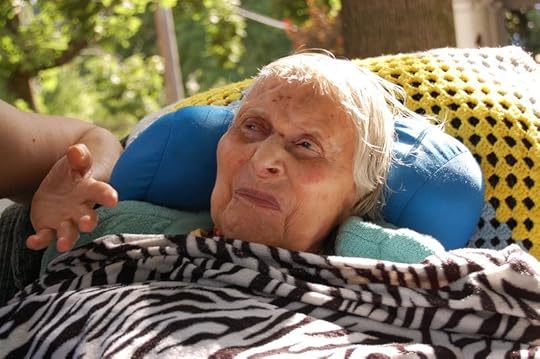
April 14, 2012
just so you know I haven't been totally slacking in the blog department...
Look, I realize that in Blog World having your last post dated December 12 when it's now the following mid-April looks bad. Really bad.
 I've had my reasons. New book (Bean by Bean). Book tour. Elder care. Not home much. Blah, blah, blah.
I've had my reasons. New book (Bean by Bean). Book tour. Elder care. Not home much. Blah, blah, blah.
But, I do walk the talk writing-wise, pretty much. I do writing practice, daily or near-daily. And I do a lot of semi-thoughtful quick writing; a paragraph or two on the issue or experience or thought or or insight du jour --- on Facebook. These quick paragraphs are more like the majority of blogs, or micro-blogs, out there. (If you click that link you'll see it takes you a 'fan page'; which I just started. Facebook made me, refusing to allow any more 'friends' to my 'personal' page. Since I consider the cult of celebrity part of the DNA of the spawn of the devil, I am not happy about this. Anyway, that's why you're not seeing many of my paragraphs/'micro-blogs' there. Yet. And maybe one day all the language around 'social media' won't seem so distasteful to me that I have to keep putting it in quotes. Maybe. )
Thing is, as you know if you read me here regularly (or irregularly. That being my fault, not yours) what I do here are not that.
They're what my wise and funny friend Ronni Lundy calls 'blongs': 'blog' + 'long' equals 'blong.' They're what used to be called essays. And to "essay', of course, means, to try.
And these just take awhile, mostly. This kind of writing takes uninterrupted, open-space, free-range thought-and-writing time. Time to get it wrong. Time to get it  right. Time to figure out what it is you're trying to get. Just time.
right. Time to figure out what it is you're trying to get. Just time.
Exactly what you don't get on a book tour where, paradoxically, you are talking about your writing, or at least the subject of your writing, all the time. (It is the writer's need for uninterrupted time that led me, in the course of my life, to periodic stays at writers' colonies, and eventually to co-found one, the Writers' Colony at Dairy Hollow, in Eureka Springs, Arkansas. Another story)
But. Even blog-, or blong-wise, I haven't been a total slacker.
In addition to Nothing is Wasted on the Writer, I have another blog, which I keep up with even more sporadically. It's called Deep Feast: Writing the World through Food, and it focuses on culinary writing and the larger questions eating, cooking, and writing about them bring up. It too, like this blog, is usually in the 'creative non-fiction' (was there ever a more pretentious-sounding term?), or personal history, line.
And there, at Deep Feast, I wrote a blong only last month (which makes it practically current events for me, though for no one else in the online world). It's seemingly about my discovery of goongoo peas.
But it's really about why there's no such thing as a definitive cookbook. Or for that matter, a definitive book of any kind.
As such, it's also germane to Nothing is Wasted. So I'm sending y'all over there while I finish up the book tour and related stuff, as well as write the next post for her. And the rest of my life. Unpacking. Laundry. You know.
Not to give anything away, but I think the next post for here is going to be about the myth of getting caught up, and how it hog-ties us. A blong story, if there ever was one. 
P.S. If you're interested in some of what the book tour bebopping included, here are some of the high points that've made it online. In February, I was on NPR's On Point with Tom Ashbrook, a stellar interview, who really, really takes the time to be well-informed on the subject and asks erudite and thoughtful questions. And, in late March, Sheryl Julian, food editor of the Boston Globe, wangled an invitation for lunch, and wrote about it here. It should be said that the wangling was not very difficult. I would frankly prefer to be talked to in my native habitat, over food. And Sheryl's an excellent, thorough, old-school, dig-deep journalist; she actually talked to people who knew me (and got a few hilarious quotes).
December 12, 2011
Are you a real writer? The sure way to find out...
It's 9:24 a.m.
I have to leave at 10:00 to drive a deeply depressed friend to her therapy appointment. I am in the middle of writing one of my long, thoughtful, typical essay-type posts, which my friend Ronni Lundy calls "blongs." I left it, and began writing this instead.
I have a bowl of Irish oatmeal beside me, cooked with diced apples, which melt to creaminess as the oats cook, studded with pieces of medjool dates, which also soften to caramel-like bits, added in the last few minutes. The bowl, brown and grey pottery, with visible finger-rings, was thrown by my late husband. If I lifted it up I'd see, on its bottom, his scratched-in signature: Ned Shank, 1971. Stirred into the finished Irish oatmeal is a heaping teaspoon of almond butter, and a drizzle of maple syrup, from the trees tapped by my nearest neighbor, here in Vermont.
I am going to see if I can write an actual short blog post, and get it done before I hop into the car to do my mission of mercy, which I both want, deeply, to do, and am slightly irritated at having to do (I have been hanging in there with my depressed friend for many months now. It's getting old. But I am ridiculously loyal, to my friend, and stubborn; insistent, internally, that I know this is part of her life process, and mine, and that she and I will get through it, and that it will someday have meaning).
I am trying to finish this because nothing in the universe, that I have found, makes me feel as "God's in heaven and all's right with the world," as writing, particularly when I finish a piece. (I accidentally wrote, and just found and corrected, "all's write with the world.")
I have 50 published books out: all with name, traditional publishers: HarperCollins (Harper & Row when they published me), Simon and Schuster, Macmillan (now also part of Simon and Schuster), Charles Scribners (now defunct), Workman. And I have one coming out with Little, Brown (leading at times to peculiar, hilarious, but truthful statements like, "I'm going in to have lunch with the Little Brown people tomorrow.")
But I don't believe, in my heart of hearts, that I am a real writer until I have written that day. That day, being each day. Being today.
It's the holidays. Should I go to a party that is large enough so that I don't know everyone and strike up conversation with a stranger, it is likely at some point he or she will say, "So, what do you do?"
And I will say, "I'm a writer."
"Oh," he or she will say. And then that subtle shift in tone. "Published?"
Meaning, are you a real writer or an amateur, just futzing around. Meaning, where do I put you on the one-up one-down scale. Should I be impressed (are you famous? have I heard of you?), interested and slightly respectful (oh, you write a column for the Brattleboro Reformer which I may have read) or merely polite (how interesting, excuse me while I get another deviled egg).
I say yes when so asked, because I am a published writer, after all. Yes. True. But if I haven't written that day, I feel, in my heart of hearts, like a hypocrite.
The outside world, in the form of real and imaginary people at cocktail parties, teachers, parents, and siblings, will tell you, directly and indirectly, that a real writer equals a published writer.
Except every writer was at some point an unpublished writer. And even every published writer returns periodically to being unpublished, during the time they are writing.
This is so obvious. Except, evidently, it isn't.
Twitter is a medium I use (I'm @cdragonwagon) and simultaneously like and loathe, in part because the same limitation of characters that forces you to be succinct and pithy also forces you to write "U" for "you" at times.
Here's the one sentence version of this post, as I put it on Twitter a few days back: "Act of writing makes U 'real' writer. O,U thought it was publication? In his lifetime,Van Gogh sold O paintings; was he a 'real' artist?"
I said above, vis a vis the location where I feel like a phony if I haven't written on the day --- any day --- when I'm asked about being a writer if I haven't written that day, "in my heart of hearts."
By which I mean, in that interior True North by which one steers; to which, if one is true, one feels in alignment, living life with purpose and integrity.
Veer a few degrees from that compass point, and one becomes a hypocrite in one's own eyes, whether or not the world notices (and it usually won't, until the degrees are so many that the degree of offness is blindingly evident).
At least I feel that way if I deviate by even a couple of degrees.
But not today.
For now it is 9:50 a.m. And though I have not finished my oatmeal, I have written.
Like one of the ads for one of the airlines used to say, "We earn our wings each day."
Today I earned my wings: I wrote. Therefore, I am a real writer.
It's a relief.
9:55 a.m.
All I have to do is hit "publish" and I will both a real and a published writer.
Again. Until tomorrow.
October 23, 2011
uncovering: a yak, a six-year-old, and some witches walk into a post...
The little girl who asked me the question was a first-grader then. Assuming she is still alive, she's 36 or so, probably with children of her own.
But our paths crossed just the one time. That was in 1982, in Atlanta, Georgia. I came to her class as a visiting writer. So I know her only as a six-year-old, and only from one interaction. In my mind she is today exactly what and who she was then: an adorable, very solemn little girl, with light brown skin and black hair caught back with pink barrettes.
The reason she's in my mind today has to do with children books and their illustrations. I have a new children's book, All the Awake Animals (Are Almost Asleep), coming out about a year from now, which will be illustrated by David McPhail. I am so delighted with what I have seen of the pictures so far that I have posted a few of them on Facebook. Which prompted a comment that reverbed me back to that little girl's question.
All the Awake Animals is my first new children's book to be released in almost a decade (for reasons I describe on a video here, made at a talk I gave about a week 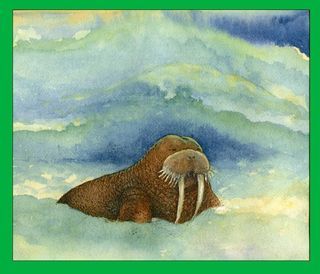 after the book was accepted by Little, Brown... and in which I slip up in a ridiculous way at the end).
after the book was accepted by Little, Brown... and in which I slip up in a ridiculous way at the end).
I am loving working with Little, Brown's Andrea Spooner, Senior Executive Editor of Books for Young Readers. She is one of the most attentive and respectful editors I have ever had; even when the discussion runs to, say, at what time of day and in what manner a vole, otter, lion, yak, walrus -- shown here catching "forty wet winks" after "wading into the waves"--- or an urubu actually sleeps. (An urubu is an African vulture; few animals start with "u".)
The book begins:
My little one,
Lay down your head
It's time for sleep
It's time for bed
You tell me,
"I'm not sleepy now,"
"Just try," I say.
You ask me, "How?"
After a few more exchanges, the mother takes the child on a slow, dreamy visit to 26 different animals, all in various stages of snooze or near-snooze. They go animal by animal, one for each letter of the alphabet, from Antelope ("asleep all the way to his antlers" ) to Zebra (who "just zzzzzzzs...") before returning to a final dozy reiteration of rhyme.
Andrea took a lot of time finding just the right artist, and she is taking a lot of time working with him, and me. In 40 years of working with different publishers, I can remember no other children's book editor who has ever involved me quite so much in the selection of the artist, and has engaged me so thoughtfully in discussing the pictures and my reactions to them.
Nor, for that matter, has that happened with any cookbook editor/art director (for non-photographic cookbooks, too, have 'spot art' and 'chapter openers' and while they are less essential than in a children's book, and though the reader may be only aware of them peripherally, these illustrations either do or do not enhance the words and recipes).
Yet this indirect collaboration I'm now experiencing with David is so good! It's so easy! It's so much fun! I wonder why, in 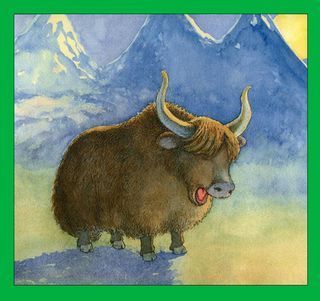 general, there seems to be, in many editors' minds, a separation-of-church-and-state thing about writers and illustrators?
general, there seems to be, in many editors' minds, a separation-of-church-and-state thing about writers and illustrators?
At any rate, I am deeply grateful. And, as I see the watercolors David is doing, I am delighted; exhilarated, even. Though perhaps that's not quite the right word, for the pictures are sleepy, cozy, dozy, soporific. You can hardly look at them and not start yawning, like yak is doing here: just what you want in a goodnight book.
Yet their perfection does exhilarate me. They are luminous and tender, but not anthropomorphic or cute. The textures --- of the animals' fur, feathers, hides, tusks --- are so vivid I can imagine children stroking the paper to feel them, and growing puzzled that they can see but not touch the softness or roughness. The backgrounds are soft, impressionistic dreamscapes, suffused with soft light; light which makes shadows, refracts on water, or pierces clouds.
As I say, I am so delighted with these pictures that I have been sharing a few of them, as they progress, on Facebook. First the sketches, now the almost-finished drawings / paintings. And my Facebook pals --- many of whom are readers, parents or grandparents, or artists themselves --- are also enthusiastic, and many have been commenting on them too.
It is in this context that Cathy Smith, who blogs marvelously at "Growing Curious", and who farms, cans and preserves at Curious Farm and sells at local farmer's markets in her area, just outside of Portland, Oregon, asked me
what is it like to have your story brought into the visual realm by someone else? since you're so comfortable in this publishing world, do you just go with the flow at this point, or does it stop your heart sometimes?"
Let's leave aside the fact that I don't think I or anyone else is exactly "comfortable" in the publishing world. Which is not only changing at this moment with dizzying rapidity technologically, but which has always been at least anecdotally on the verge of collapse, for as long as I can recall.
I still remember my mother, the writer-editor Charlotte Zolotow, who was active during the period which, we can say in retrospect, truly was children's book publishing's golden age, muttering darkly and scornfully about Harper & Row being taken over by "the Harvard MBA's" and "the eleventh floor" --- synonyms for management.
"Can you imagine?" she said once at the dinner table, indignantly, when I was young. "They want me to do something called an ROI!" "What's an ROI?" I asked; I was maybe 10 or 11. "I didn't know either, honey," said my mother. "It's --- " she could hardly splutter it out --- "It stands for return on investment!"
"Well, what's that?" I asked.
And thus, in what was said and the tone in which it was said, and what was not said, I learned business 101; and that it was implicitly in conflict with art, beauty, and purpose. I'm still trying to undo the imprinting on that one. I would like to break the paradigm/archetype of the impoverished artist or writer who lives in the garret. I would like to think that Mammon and the Muse can sit down and have at least an occasional cup of amicable tea, and some hot buttered scones, together.
Don't worry, I'm getting back to that little girl in Atlanta.
My fourth or fifth picture book, Katie in the Morning, was given to a very young artist who had never illustrated a book 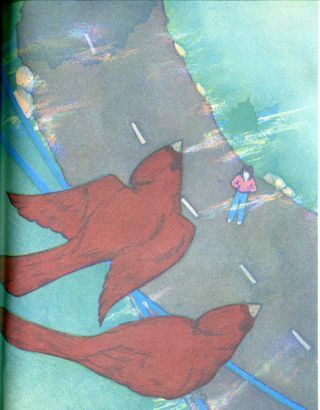 before.
before. 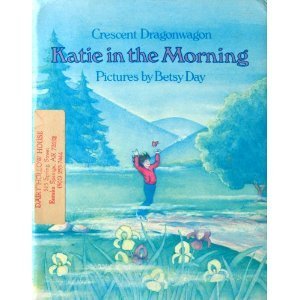 This was in 1982/ Full-color illustrations were rarely done at the time; instead, colors were made using transparent overlays, a very tricky business, and in the hands of someone who didn't know what they were doing, could very easily result in muddied, unsatisfying hues. This artist's inexperience showed, and did not, I thought and still think, do justice to its text.
This was in 1982/ Full-color illustrations were rarely done at the time; instead, colors were made using transparent overlays, a very tricky business, and in the hands of someone who didn't know what they were doing, could very easily result in muddied, unsatisfying hues. This artist's inexperience showed, and did not, I thought and still think, do justice to its text.
But justice... who are we, finally, to say what it is and isn't? For, here's a remarkable thing about the present era's access to information: I'd  forgotten the name of the woman who did those illustrations, so I went downstairs to get a copy of the book (and, yes, the pictures seemed every bit as unappealing to me as they always had).
forgotten the name of the woman who did those illustrations, so I went downstairs to get a copy of the book (and, yes, the pictures seemed every bit as unappealing to me as they always had).
But... I Googled her. And there she was: Betsy Day, Illustrator. And my-oh-my has she ever matured as an artist! Take a look at those dancing chickens, for example, on her website. She does gallery work, too, and she's written and illustrated one title, Stefan & Olga, left and above.
Assuming I had written something with the right fit for her current style, I'd be delighted if she was to do one of my books today.
But, though I didn't care for her work on Katie in the Morning back in 1981, on reflection it is good that Harper & Row (this was before they were Collinized, as I like to say) took a chance on Betsy. Their doing so helped enable her to develop into the artist she has become. That is, one might say, a truly good ROI, with, perhaps, a whiff of "justice" in a cosmic sense. Yes, I wish they'd asked her to redo Katie, or ... Well, but I've lived long enough, now, to know that I haven't a clue as to the really big picture. I've kissed the dream of understanding why fully, about much of anything, goodbye.
Here's a slightly expanded version of how I answered Cathy Smith, on Facebook: I told her that when I had disliked the art that had been chosen for me, and about which I'd had no say,
... it was, and sometimes is, pretty unhappy-making. Some editors ask for and welcome feedback which they transmit, politely and kindly, one hopes, to the artist. Some do not. If I can have a beneficial effect and help improve, from my perspective, the fit of the art to the text, I do... If not, and I truly dislike the art, generally what I do is get very disturbed and unhappy about it, cry some, and then live with it. I get over stuff pretty fast. There are only a couple of books where I feel the pictures were truly disastrous; after all, the publisher, too, wants the books to be good as a whole and they do try hard, if sometimes misguidedly, to get the appropriate illustration. There was also one in which I really didn't like the mood of the pictures, though they were good --- just so not what I would have chosen.
That book was Bat in the Dining Room, well-executed by S.D. Schindler in a funny, cartoony style. These pictures are charming in their own way, I think now; I probably would have enjoyed them in someone else's book, or even a different one of my own. But in this one, I so wanted the mystery and wonder of night, such as Jerry Pinkney had created so rapturously in my Half a Moon and One Whole Star, and later, in his own recent retelling of Twinkle Twinkle Little Star. Though I never truly loved the pictures in Bat, I eventually came to peace with that one more easily than I did those of Katie in the Morning, which made me wince, and still do.
(If you should read this, Betsy, I'm sorry. Truly, I am. But I'm guessing you wince, too, as I do over some of my own early work. I hope we both accept these things as part of the process; impersonal, implacable, difficult, with exuberance and disappointment in something like balanced measurement. We must, though maybe it's presumptuous of me to say so: but we're both working artists, who've been at it awhile. And if we didn't get that this is how it is, often uncomfortably, we would've surely given up, no?)
Katie had come out around the time I paid the visit to that first grade class in Atlanta. Though I think children in 3rd, 4th, and 5th grade get much more out of a writer's visit than those kids in earlier grades (who still aren't too clear on the whole concept of "author" generally --- and why should they be, they're in the psychedelic, improbable mystery of being so young that anything... could turn out to be anything!), of course schools always want you to at least pop in and read a book to the youngest students.
And of course I always ask if there are any questions; though at that age, there usually aren't. It's more like, "Does anyone have any questions?" and a small face will look up earnestly and say, "I have a cat."
But that particular morning, that little girl in Atlanta did have a question. A real question, and, as I have said, she asked it with solemnity and gravitas. Her manner made me wonder later if she, literal as all children are, had perhaps been puzzling over it for weeks, as I remember puzzling over why "witches" were in the Pledge of Allegiance. ("And to the Republic, for witches stand...")
"Do you believe," that little girl asked me, "that it's true that you really can't judge a book by its cover?"
This was a question I had never been asked before, or for that matter since.
I thought about it.
"Well, " I finally said, thinking of Katie, "I wrote a story once that I really liked, but I didn't really like the pictures. So I guess, if you picked up that book, and you looked at the cover, and you put it down without reading the words because you thought the cover was ugly, I think you would have judged the book by its cover and made a mistake. So, yes, I think it is true that you can't judge a book by its cover."
Judging. These days I try to replace judging, and certainty, both of which are fixed and static, with curiosity and inquiry, both of which move, change, and flow. As life itself does, and with it, our perspective.
I would have sworn, based on those long-ago illustrations of Katie in the Morning, that Betsy Day had just called it quits. I am so deeply glad that this not the case, that she has grown into her talent, and her talent continues to grow.
And I am glad that I tell students in Fearless Writing that every piece of writing is essential to the writer, regardless of whether it works as a piece or not: because this is true. Seeming unsuccess is as important as seeming success in our lives, as artists and as human beings.
And I love the mysterious fact that somewhere, out there, is a 36-year-old woman who has no clue, no clue at all, that she lives forever as a child in the mind of a woman of whom she almost certainly holds not the faintest memory.
And I am glad my mother, now 96, who has now completely forgotten Harper & Row, was once so deeply passionate about books and art.
And I am glad that I neither accepted nor rejected her scathing views on ROI's, but continue to wrestle with them (a match I think is now taking place on the international level, with the Occupy Wall Street movement, by the way; in essence, can there be enlightened, good for people-planet-and-profitable capitalism, or not? "People" presumably including artists and writers and those who self-nourish from seeing or reading their work.)
And I am glad to be witnessing David McPhail's illustrations move from sketches to completion: more flow and process. This is the best part of "what is it like to have your story brought into the visual realm by someone else" --- the art doesn't just 'illustrate' what you've put there but expands the story, in a way that is both compatible and surprising. I am amazed and delighted to see David's insertion of what my mother used to call "a visual sub-plot" --- in this case, the animals creeping to the now-sleeping child's bedroom window and peeping in. 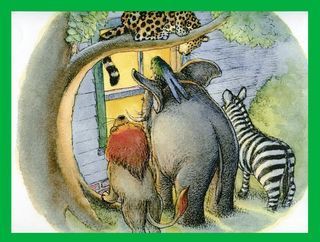
Why are they there, those animals? To listen to the story the mother is telling, about them? Because, to them, a little boy is exotic and strange? Or perhaps they are not "really" there; perhaps the sleepy child is "only" imagining them. Who knows? I don't, and neither will the book's young readers. And this isecond story is what the artist has added, layering what I wrote with his own, subtly mysterious and charming.
And what expression is on the faces of those animals as the gaze into the window of the sleeping human child, jaguar hanging upside down to do so? Perhaps they gaze with longing? Perhaps curiosity? Maybe.
But, I think, certainly not with judgment.
You can't judge life by how it looks and feels at any given time; that is only its cover.
You have to open it up.
October 6, 2011
elegy for a tomatillo ... and Steve Jobs
He went back inside, and came out again through the French doors, leading to the garden, where I'd already gone. "Supposed to go down to 28 degrees tonight," he reported. "Yikes," I said, and we both returned to the kitchen to grab several large bowls and the yellow colander. Then back out.

David worked on the beans, which have been producing generously all season long, the pole beans, climbing their rustic tee-pees, tendril by tendril, at the edge of the garden, adding what to my eye is such charm, the
 sunflowers behind them. He picked my favorites, the exuberantly abundant densely podded Spanish musicas. Then he picked the others: the flatter white and scarlet runner beans that are so good when cooked slowly, the rattlesnake beans, with their green purple-mottled pods, encasing white beans also mottled purple. Then he crouched to work on the bush beans: the limas, the Kentucky wonders, the yellow waxes, the black valentines (green pods, shiny black beans inside), and the royal burgundies (wondrously purple-podded, and though the pods turn green a few moments after they're submerged in boiling water, the water, after their cooking, turns turquoise, which keeps the wonder going, as far as I'm concerned).
sunflowers behind them. He picked my favorites, the exuberantly abundant densely podded Spanish musicas. Then he picked the others: the flatter white and scarlet runner beans that are so good when cooked slowly, the rattlesnake beans, with their green purple-mottled pods, encasing white beans also mottled purple. Then he crouched to work on the bush beans: the limas, the Kentucky wonders, the yellow waxes, the black valentines (green pods, shiny black beans inside), and the royal burgundies (wondrously purple-podded, and though the pods turn green a few moments after they're submerged in boiling water, the water, after their cooking, turns turquoise, which keeps the wonder going, as far as I'm concerned). I love beans, as you can tell. In fact my book about them, Bean by Bean , will be out early next year.
But. Given the quantities David was picking, I would clearly be canning, pickling, and freezing in the near future. (Below, last year's Green Tomato Mincemeat, which I'm about to make again, from my own Passionate Vegetarian)
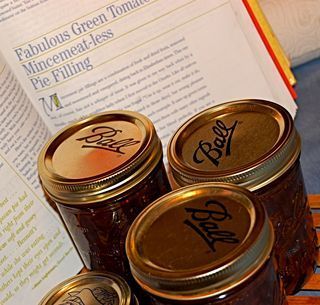
While he worked on the beans, I turned my attention to the tomatillos.
I was thrilled, three years ago, to find tomatillo starts at the farmer's market. I love tomatillos (for those of you who don't know them, they're in the tomato family, usually bright green --- though there are purple varieties --- and protected by an elegant papery husk; and they are the stuff of salsa verde). I think I bought six or seven plants that first year, with little idea of how enthusiastically and messily they would grow and produce.
At harvest that year, after canning a dozen half-gallon jars of salsa verde and the same again of just plain tomatillo puree, for our household of two --- yeah, we have a lot of guests, true, but still --- I called it quits. When I added the pulled-up plants to the compost pile that year, I am embarrassed to confess I did so, consciously, knowing I was still leaving plenty of perfectly good tomatillos on the vine: me, to whom wasting food is morally repugnant. I begged the pardon of the plants, and every hungry person in the world, and the generous universe itself, for forgiveness as I discarded them. But I did discard them.
So, last year, I planted cautiously: just two tomatillo plants. They bore, but not with nearly the fervor of their kin the year before. They were far fewer fruits per plant, and, strangely, in quite a few cases the husk would grow full-size, but the tomatillo within it would be only the size of a cherry tomato. I ended up canning just 1 half-gallon and a quart or two... which I kept aside for what is now an annual tradition at the Labor Day Fearless Writing: the Whole Enchilada. Because one dinner at that event, of course, must be enchiladas, which I sauce in long beautiful stripes of red tomato salsa and green salsa verde, and I couldn't know how well the following summer's crop would bear.
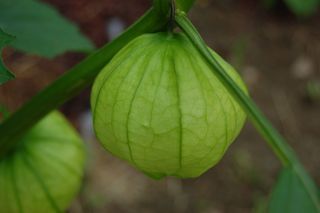
This year I hedged my bets. I put in just three tomatillo plants, gave them a corner of the garden in which they could flop uninhibitedly to their heart's content, and basically left them alone, harvesting just a few to freshen up and round out the last year's canned ones, for the Whole Enchilada dinner in early September, which is too early to justify wholesale harvest.
Otherwise, I left them alone. That is, until tonight.
As David did the beans, I pulled tomatillo after tomatillo from the spreading, generous stems, many stems per plant. They bore, this year, as abundantly as they had that first year. I'd break off a stem, and pick the tomatillos from it. I'd drop the husk-wrapped fruits into the 2 1/2 gallon stainless steel bowl, then toss the
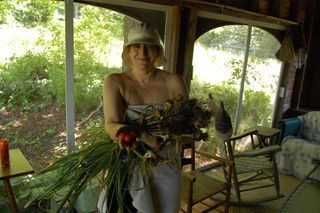 stem to the side of the garden to pick up later during the serious fall garden clean-up, which we'll do in a few days, at the same time we plant the garlic.
stem to the side of the garden to pick up later during the serious fall garden clean-up, which we'll do in a few days, at the same time we plant the garlic.(Plant garlic in fall; harvest the next summer... as I did, one hot, hot day a few months back, on my way up from a dip in our pond, as I passed through the garden. Silly picture, but so true to that moment.)
I brought one full bowl of tomatillos in from the cool darkening night to the warm, bright kitchen. I emptied it carefully onto the kitchen counter, returned to the garden, and began to fill the bowl a second time. There was still some light, the sky still recognizably blue, but it was growing darker, more chill by the minute. A sudden half-moon rose in what's east this time of year (here in this northern latitude, the directions change so radically, disorientingly, with each season). Very large, very bright, the moon was more cooly silver than golden, and a few wisps of haziness veiled it. Three or four small puffy pink clouds, still colored by the departing sun, hovered near the moon, seeming like slightly anxious handmaidens: "Is there anything you need?" "Is everything all right?"
Harvesting under this illumination, I suddenly thought of the Edna St.Vincent Millay poem my mother, now 96, used to quote when I was a child, the line "she weeds her lazy lettuce by the light of the moon" sounding in my inner ear as if she had just spoken it in her young mother's voice, getting across, somehow, how succulent those words were to her. My mother, who has forgotten every poem she ever knew, but who, paradoxically, seems to me happier moment to moment than she ever was when in her so-called right mind.
I pulled another large stem from the tomatillo plant I was working on, and, as I pulled the fuits off of it, completely unexpectedly, my heart gave a sudden contraction of grief. Because there, arching out from it, was another stem, covered with the robust fleshy leaves... but also, blossoms. Small bell-shaped bright orange blossoms, star-like in the night, dotting that whole stem... maybe fifteen of them.
"Awww," I called out to David. "I just found a whole lot of blossoms here. They didn't get to be tomatillos!"
 And then, surprising myself, I added, "I wonder if it was like that for Steve Jobs."
And then, surprising myself, I added, "I wonder if it was like that for Steve Jobs." "What?" asked David, in that startled, did-I-miss-something tone, which suggests if-I-didn't-miss-something-you-may-be-insane.
"I wonder if he felt like he still had all these blossoms that weren't going to have a chance to bear fruit."
As I continued picking, that thorn still in my heart, I thought about Steve Jobs, the little I know about him.
I'm still a PC user and I don't own an i-anything, though I can't count how many people I know who've had an Apple moment where the heavens opened up and everything stood revealed, and I have no doubt that one of these years I will have an i-something, and maybe my own Apple moment.
But I do have a mouse. And I do have a laptop. And I do know how much he revolutionized the world. And how much people who knew him, along with the countless many who didn't, revere not just his work, but him.
And then, there are all the things he said that are circulating now: About how he'd "wanted to leave a ding in the universe." And "... the only way to do great work is to love what you do. If you haven't found it yet, keep looking. Don't settle. As with all matters of the heart, you'll know when you find it. And, like any great relationship, it just gets better and better as the years roll on."
But his rolled on only to 56.
And from here, standing at the cusp of 58 and 59, blessed with work I love doing, I know that if I received a terminal diagnosis tomorrow, I would feel like one of the plants I was pulling tomatillos from: partially able to be harvested from, partially fulfilled, but with so many, many unpotentialized blossoms.
And, I guess inevitably, I wondered about Ned, about the seconds when his bicycle flew through the air before landing in and breaking the windshield of the oncoming vehicle --- if he had a chance to know,
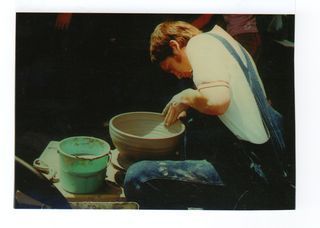 wonder, regret all the things he was not going to have a chance to do. (Ned, right, as a 16-year-old, long before I knew him, throwing wheel pottery in high school. When we were affianced and went to meet his parents, he opened a door in their attic and showed me boxes of his pottery. "My dowry!" he said proudly. I still eat from his soup bowls).
wonder, regret all the things he was not going to have a chance to do. (Ned, right, as a 16-year-old, long before I knew him, throwing wheel pottery in high school. When we were affianced and went to meet his parents, he opened a door in their attic and showed me boxes of his pottery. "My dowry!" he said proudly. I still eat from his soup bowls). I talked to the young man whose pick-up it was --- this was early days, just a week or two after Ned's death; not six months later, when he decided to sue "the estate of Ned Shank" for "pain and suffering due to PTSD" --- on the phone. I told him I didn't hold him responsible; that from what I could tell, from the accident report, it was an act of God, and the laws of phyics.
Then I asked him a question I maybe shouldn't have asked. But I wanted to know, I wanted some clue: how did he feel? Did he know? How much? "Did you see his face, before the moment of impact?"
"Yes, m'am, I did. "
"And... did you get a sense of ... what was his expression?"
"It was like, 'Oh... crap.'"
But balanced against that is the story of the lovely woman named (and how poignantly this struck me) Grace. Grace was 2/3 small-town acquaintaince/ colleague, 1/3 friend, and she was in the car behind the pick-up which struck Ned. She got out, and sat with Ned in that two-lane road, as traffic backed up on both sides, until the EMTs got there.
She told me that when she first sat with him, bloodied and broken but still alive, she said, "Ned, this is Grace." I always wonder how he heard that; how, in that state, he interpreted the word 'grace'. And afterwards, from the first time Grace described the scene to me (very late that same night, after he'd died) to her words at his memorial, to the last time we spoke, identically: she talked about the feeling of peace that descended over the two of them.
And that, when she told him I had been notified, he repeated my name.
Ned's first children's book, The Sanyasin's First Day , had been published just six months before his death. One of the first condolence calls was from his editor, Judith. Judith is a person whose emotional affect is not so much flat as consistently placid, unflappable. For the first time, in the many years I had known her, I heard her express unbridled emotion. "He would have written so many more books!" she said between the sobs, gusts of feeling shaking her. "I just know he would've!"
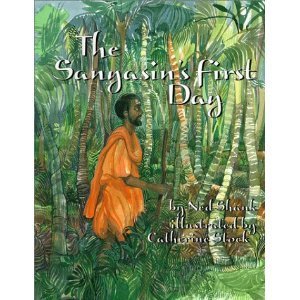
And he would've painted and drawn countless more pictures. Curled up with me so many more times. Had so many orgasms, and contributed to mine. Closed his eyes in pleasure as he let the first bite of any dessert he particularly liked dissolve slowly in his mouth. Laughed so hard that his whole face scrunched up and all you could see of his huge eyes with their absurdly long eyelashes was the tiny edge of the lashes. Made, on days when he woke up, staggered down to the bathroom, first beheld himself in the mirror and saw his hair crunched from either side into a tall, odd thatch, a "Woo-hoo-HOO" sound, which we referred to as the call of the Great Crested Droon, and which he would make while standing on one leg, indeed, looking oddly like a very peculiar, leggy shore bird.
He would've done so much: in and of himself, but also for and with others.
But, like the tomatillo blossoms, now and forever, he would not.
Ned was 44. An early, killing frost.
Steve Jobs, 56.
xxx
One set of my present-day neighbors, Beth Kaplan and Jim Jordan, who --- with their daughter Stella --- live right down the hill from us here in Vermont, work for Antioch University of New England. Both Beth and Jim are in the Department of Environmental Studies.
Beth runs their graduate center in ecology and primate research, in Nyungwe National Park, Rwanda. She comes and goes from that country several times a year. At any given time, a couple of Rwandan graduate students live in Beth and Jim's downstairs.
Last Thanksgiving, we had dessert with Beth, Jim, their daughter Stella, William and Yves, the students staying with them, and a host of their other friends, in the educational, environmental, local and international communities in which they move. At one point, Yves and William and David and I were talking. They were astonished to learn that David was 71 (true, he looks young for his age). They were also astonished to learn I was 57 (true, I also look young for my age).
But their astonishment had little to do with looks.
"How old people live in your country!" exclaimed Yves. "In my country, 45 is old."
Perhaps a blossom isn't an immature fruit, but a blossom, perfect, orange, bell-like (if it is that of a tomatillo). Perhaps it is complete, completed, in itself.
Perhaps not.
Perhaps we write stories, and for that matter, blog posts, because there is no way we can ever answer questions definitively, in a world where loss and beauty and incomprehensibility all exist, side by side. Our narratives attempt to give shape and form to something so much larger than form itself, something that began long before we were here and is ever hurtling towards an outcome that will be forever unknowable to us.
Our narratives, by contrast, have a beginning, middle, and end. A story is, or can be, shapely.
It is not as messy as a tomatillo plant, as disorienting as a moon that rises in one side of the sky in October and in a wholly different place in June. It can have an equality and balance and sense a Rwandan student who witnessed the murder of his older sister (who had just, William once told me, bought him a soda, before the militia came) can never have when he considers ... well, life, or America and Africa, or me, or you, or Steve Jobs, or books about beans, or enough wealth that you could ever, under any circumstances, knowingly discard any food.
Yet, a story can include all these things.
Tomatillos: I have planted them, harvested them, cooked them, and even wasted a few.
But maybe not the latter. Tonight, the night of this fall's first frost, however imperfectly, I've written about those tomatillos, including the discarded ones, and the insights and longings they managed to evoke for me. This being so, nothing, even the tomatillo plants thrown, still fruiting, in the compost, is wasted. Nothing, when it can take you inward through writing, at all.

August 22, 2011
in which I thank my plucky stars, though not without regret
The way my father always told it, as it turns out, was better.
"On his ninetieth birthday, the late Maurice Chevalier ..." my father, himself the late Maurice Zolotow, would begin, relishing the telling so much he almost gave off sparks of pleasure, " ...was asked how it felt to be 90. 'Marvelous!' he replied, in that suave, beautiful, wry, French voice of his, 'When you consider ze alternative.' "
I decided, for this post, to check, to see if the ever-exuberant Maurice, had gotten the exact birthday correct. And what did I discover?
What Chevalier actually said, and not, as far as I could tell, in response to being asked about a particular birthday, was this: "Old age isn't so bad when you consider the alternative."
Which, compared to my father's version, is pretty lame.
What brings this to mind is that today, as I was making the bed, I found myself considering alternatives.
xxx
My late husband was, uncharacteristically, very particular about certain things relating to death. I say 'uncharacteristic' because he didn't, for instance, keep the life insurance premiums up to date nor leave a list of Quicken passwords (thus, when he died in a bicycle accident at the absurdly young age of 44, my bereavement was not just emotionally and physically devastating, but financially so as well). But, some time in the late 1980's he had been to a funeral he found "gruesome" and he came home, wrote up a funny, acerbic little note about it, and made three copies.
One he gave to me: I laughed and promptly forgot about it. But 15-some years later, after his death, I found the other two: one in a file labeled "important papers" and the other in the safe deposit box at the bank. (The location of its key, however, was as unknowable as the Quicken passwords; it cost $25 to have the bank get into that box. Which was still much less than what Intel charged to "de-encrypt" the passwords. But when a sudden "I", as opposed to "we", must find out how much money I have, well, you pay Intel and you pay the bank).
One of the things Ned had deemed so important that he wrote it three times was that he wanted his body cremated, not buried ("Who needs to be lugging around 225+ pounds in a box?" was how he put it). And he also wanted his ashes placed in a certain river in South India.
(Damn. I was going along fine, not one shred of the automatic tears-well-in-the-eyes, heart-horripulating grief-moments until, unaccountably, I wrote that last sentence. Which proves one of the points I will be making: that when grief wants to be felt, it will find a way to make you feel it.)
By the time I took his ashes, in a plastic bag, to India, still relatively early days after his death, I still had the ridiculous idea that you could somehow outsmart grief.
I had discovered that almost anything associated with him, activities we had done together, places we had had conversation, taken walks, eaten together, and on out to infinity, could bring on those spasms.
So, I cleverly decided that to avoid this I would travel to India via a route we had never taken. I would not go New York and then via London, or Zurich, or Frankfort, to Bombay. I would not go Los Angeles, and then via Singapore or Seoul, to Bombay. Instead I would travel to San Francisco, and go from there to Hong Kong, and from Hong Kong to Sri Lanka, and from Sri Lanka to Trivandrum, in southern India, skipping Bombay altogether.
I also decided to take the well-meaning but essentially impossible to deconstruct advice given to me by many people: "Be kind to yourself." "Be gentle to yourself." "Be good to yourself." So rather than bullheadedly charge my way straight through the journey, I would stop along the way, give myself a chance to rest and recover, in these new, not-associated-with-Ned places.
So there, grief, I remember vaguely thinking as I made these travel arrangements.
Thus I found myself in a hotel room in Hong Kong, looking out the window across an expanse of water towards Kowloon, at a beauty and terrain which seemed to me singular in both its beauty and its Chinese-ness.
Thus I found myself knowing that had Ned himself been with me (instead of that improbable plastic bag of ash which I was supposed to believe was all that now remained physically of that big handsome fellow with whom I had spent 23 years), his watercolors, brushes, soft pencils and pad would already be out, and he would have been sitting, riveted, beside that window, jet-lag be damned, his tall form curved over that pad, his attention absolute, painting or drawing for probably a couple of hours.
Thus, I discovered grief, far from being outsmarted, had outsmarted me, in this form: "Why couldn't Ned be here to see this? Why will he never get to experience this?"
And thus I found myself, on the way back from India, having completed the task the once-living, now-dead Ned had set out for his still-living widow, at the Mount Lavinia Hotel in Sri Lanka.
xxx
The Mount Lavinia is a 4-star hotel, an over-the-top architectural artifact of the days when Ceylon, as Sri Lanka was then called, was ruled by the British. The good old, bad old days. The days when the sun never set on the British Empire and the underlying "nice country, we could use its resources, we'll take it" ethos ruled.
Built in 1806 as the grand country house of Sir Thomas Maitland, the second governor of that small island country, the Mount Lavinia is sited on a promontory above the Indian Ocean, which surrounds the mansion on three sides, an easy scramble down to an immaculate white-sand beach.
The place, an elegant, beautiful, impressive pile, enormous, embodies everything one might think of as the romantic style of the colonial tropics. (For you must be able to hold romance, appreciation, and aesthetics in one hand while at the same time holding history, imperialism, theft, oppression, and racism in the other... at least, I think you do, especially at the Mount Lavinia and similar places, like Raffles in Singapore, at least before Raffles was Disneyfied. If you can't grasp both sides, what you hold when you try to understand a Mount Lavinia, is a literal half-truth).
So picture the Mount Lavinia. Tall ceilings, ever-circulating fans. White marble expanses indoors and out. Terraces with vintage rattan couches and chairs and tables. Enormous windows. Gigantic potted palms. White walls, mahogany paneling. Velvet-covered sofas and arm-chairs, very cushy, inside, beckoning a guest to sit and have a cup of tea or a nip of sherry. Polished brass. Views and more views. Manicured gardens. Statuary.
And everywhere, as it is today (or was when I was there), the brown-skinned servitors who keep it all running smoothly. Some uniformed, standing guard or offering assistance or leading guests to their table. Others mopping, sweeping, polishing, gardening, tucking in, folding down, endlessly and mostly unobtrusively.
What did I do during the three or four days I had allowed myself there before my return to the U.S.? How was staying there being kind, good, or gentle to myself, as I had been told to do? I'll be damned if I can answer either question with full accuracy. I can only answer in pieces.
I swam in the warm sea, aware that the Lavinia's lovely and near-deserted beach was bordered, on either side a half-mile down, with walls, on the other sides of which the same beach teemed with native Sri Lankans, messy, populous, loud.
I slept and woke at odd hours.
I kept finding myself shaking my head, over and over, at the unreality of every single part of my present and presumably future life --- where I was and where I would be, without Ned.
At one point I remember looking at the room service menu and seeing the snack items described as "tit-bits", and rapidly dissolving into laughter which quickly turned to those endless, exhausting sobs. Because how Ned, who adored large breasts, would have roared and carried on at that! And how instantly it would have become a riff, a reference in our ongoing private personal language of references and experiences.
And how that language, which had ever and always had only two native-speakers, was now, to all intents, dead, as absent of life as the ashes I had scattered by the handful standing in the Pamba, as they swirled around me and then slowly floated away: light gray ash, dark brown water.
At another point, in my small room, facing the sea, I sat at the dark wooden desk, writing, crying, thinking, or all three. Without forethought, I took my wedding ring from my left ring-finger, where it had stayed for 23 years. It was as if I had slammed into a wall of emotion as forceful as the physical tsunami that was to strike Sri Lanka years later. Before I could be sucked completely under, I immediately shoved, jammed, that ring back on my ring-finger.
Shortly after that, sitting at the dark wood desk on a tropical night, the surf audible from my room, I wrote the following poem:
How It's Done
I don't know how
to not be married to you
I guess like this
I wake up every morning
and you are still dead
xxx
At one point I went up to the formal dining room for dinner. I was not eating much, but "You have to eat," as people kept telling me, and there was enough of the curious experience-glutton in me to still want to check out the atmosphere, the food... though when I ordered, or went to the buffet, I found I could only swallow a bite or two before my throat closed over.
It must have been a Friday or Saturday night, because every single table except mine was filled with people in groups. Most, from the speech, were Australian; there were a few Europeans. No other Americans present, as far as I could tell. A few tables had couples, most larger groups. There were many groups of 4 to six; families, I imagined, older parents with adult children and their spouses, vacationing together. And there were several very large groups, 12 people, 20, well-dressed, cheerful, laughing, at long tables, a lot of standing up and sitting down and going over to talk to someone and then coming back, the occasional toast made. I learned later that the Lavinia was a popular wedding destination ("one-stop", as the hotel's web-site helpfully explains).
In all that room, humming with guests and servers and kitchen staff refilling the buffet, the fans swirling, the windows open to the ocean breeze, the potted palms rustling with both the wind and the fans circulating the air, I was the only solo diner in the restaurant.
Now I am not and have never been one of those people who hates to eat at restaurants alone. I do it often, and always have, and kind of enjoy it. I always bring a book. I read some of the time, but if the food is really good or the atmosphere interesting, I make an effort to put it down and just be present with the experience, eating, watching, and thinking my own thoughts.
But that night, under those circumstances...
I watched as a man and woman, in their late twenties or early thirties, walked towards the buffet. I remember she was wearing a brown skirt of a light loose velvet with burnt-out designs, swirly, with a deliberately uneven hem. She walked with her chin slightly turned up, a bit ahead of him. He was gazing at and focused on her; she had a kind of pride and arrogance, as if she knew he danced attendance on her, as if she knew she were beautiful and desirable (though, to my eye, she wasn't particularly). It was the gait and stride of a woman who is aware she is adored and takes it for granted without knowing she does.
I recognized all this, or thought I did, because, as I watched them I thought, with a pang, I used to be like that. I wished she had been able to turn around, to tell her escort (husband or boyfriend), "I love you! I bask in your admiration!", to suddenly kiss him on the cheek or the mouth, or to catch his eye and laugh. But she couldn't, or didn't. She was enjoying being the beloved too much to love. I had done this in some of my years with Ned. But, and for this I will forever be thankful, I had woken up a few years before his death. I believe that by the time he bicycled out of this world, Ned knew that I loved and wanted him every bit as much as he did me.
I had a small paperback book with me at the Lavinia dining room. I don't remember which book. I do remember making a conscious decision, though, to put it down. To look, observe, feel what I was feeling, to not zone out with the slight addiction of somewhere else a book can sometimes afford, though probably nothing could've that night.
I put the book down. I noticed the girl in the brown velvet skirt, the cant of her chin. I noticed the indoor palms (one just behind me in an enormous pot), as I sat at the small linen covered two-top for one ("Will anyone be joining you, madam?" " "No", and like that the silverware and napery across from me had been removed).
The table was towards the center of that busy room; I was a quiet island in that ocean of movement and sound, business and joviality. I noticed the sublimely temperate night air, the fragrant steam released as silver domes were removed from large white dishes, the waiters in their whites, the maitre d in his black jacket. I noticed the music; incongruous but of course apropos in a globalized world, in a colonial luxury hotel that catered to westerners: James Taylor, singing, "You've Got a Friend."
I noticed, in a strange almost anthropological way, that my heart was breaking; had broken. The grief, the still-gradual sinking-in of from now on, for forever, he is gone and it is non-negotiable, there is not one thing you can do about it. You will never be happy again. This is your life now. And observing, observing, observing.
As I felt and watched myself feel, a thought, distinct as if lettered in a dialogue balloon, appeared in my mind.
This is brave. What you are doing, Crescent, right now, is brave.
Then, an instant, internal, screaming rebuttal, as noisy inside me as a toddler shaken by frustrated desire, tantrumming by the candy display at check-out when his harried mother refuses to buy a Kit-Kat:
But I don't WANT to be brave! I don't want to be! I don't want to be!
Observed. Duly noted. As was the next line of the internal dialogue:
Well, would you rather be cowardly?
xxx
Three years later, during my first winter here in Vermont, the pipes froze. I called the plumbing and heating company, they came to thaw them, but used a propane torch which was, unknown to them, defective. My kitchen exploded.
Fortunately, the young men doing the thawing suffered no permanent scarring or damage to their lungs. They were, however, out of work for six weeks.
And me? I was out of my home, the home I had just bought, just moved into, for six months. The rental house I found was nice enough, but I couldn't believe this latest turn of events. Just simply could not believe it.
One night I called up one of my oldest, dearest best friends, Bill Haymes.
I said, "I'm sick of it!"
He said, "Yes?"
I said, "Ned and I go through that really tough spot, I stick it out, we don't divorce, it's great. Then he fucking dies! He DIES! Then I lose the ... " (we will pause in this telling for an allusion to the loss of something else tender to me in my old life) " and the..." (pause for an allusion to the loss of yet another something else tender to me in my old life). "But no, I pick myself up, I sell my stuff, I move fucking across country and I start all over again. But then... and then... then my fucking KITCHEN blows up? My KITCHEN blows up and I have to spend half a year in a rental house? I am so goddamn SICK of being the resilient plucky little heroine, I hate it, I'm sick of it!"
Bill listened thoughtfully, as ever. Then he said, "Yeah, but you know, Dragonwagon, what's the alternative? Whiny, depressed, angry victim?"
"I know!" I snap at him. "I know! That's why I'm opting for plucky! But I don't like it!"
xxx
Why was I thinking about all this, and recalling my father quoting Maurice Chevalier, as I made the bed this morning?
Because, frankly, my life is pretty good at this moment, at least in the world within myself. I'm happy, my writing and teaching are going well, I'm learning some new things I'm very excited about, I live on an indescribably beautiful piece of property in the most progressive state in the union. If it was just me on the ride, right now I think life would feel almost perfect (although then I would probably be lonely, so maybe not so perfect.)
But it's not just me, and never will or can be. And, though I feel pretty calm and happy, frankly things could be easier.
I'm carrying some extra weight: I'm carrying oversight and deep involvement in the care of my 96-year-old mother, with whom I spend one week each month (it's a four-hour drive to her place), and about whom I have just gotten over a brutal two year struggle with a sibling. I "won" in the sense that I now have truly exceptional caregivers in place and she is now being well and lovingly taken care of, and his campaign of unceasing verbal abuse and threats towards me has abated for, oh, five months now. But still.
And, I'm carrying a friend, one of my dearest, who is suffering from deep depression. To carry this friend, to leave room for her to experience what she experiences, to refrain from attempting to fix it while making sure she gets to therapy and goes out on walks and takes her meds, making sure that I remain compassionate and open to her, but also self-protective of my own heart, making myself immune to her mood, unaffected by it... this is wicked hard.
I am not at all sure I'm doing it right. I am not at all sure, just as I wasn't when dealing with my impossible brother, that there is a right way. You just do the best you can, and keep checking in with your integrity, and hope things turn out. And they may, or they may not.
Another friend, aware of all I was working with --- I am, thank God, rich in friends ---, asked me last Saturday, "So how are you doing with all of that?"
We were swimming together in the pond. I took a few strokes in that deep, cold water before answering, letting it clear my head so I could reply honestly. Thinking about this is like thinking about the Mount Lavinnia: opposites coexist. Right now, I am happy. Right now, I am troubled. These things are true, side by side.
Finally I said "I think, really, that I'm doing about as well as I possibly could under the circumstances."
And, that's true.
But, it still doesn't feel particularly good.
And that's just my little immediate world. When it comes to the daily bad news about climate change and pathological partisanship and fringe-owned hate-broadcasting mass media and the rich getting richer and the poor getting poorer and the world going to hell in a hand-basket at such a shockingly, alarmingly fast rate of speed... well, as Truman Capote said, "Honey, don't let me commence."
Making the bed this morning, I felt sadness and worry at my friend's suffering lapping the shore of my well-being. I felt exhaustion as I edged up to the fact that the weekend caregiver for my mom is not remotely as good as our heaven-sent weekday caregiver, and will have to be replaced again soon, a destabilizing, time-consuming process that could possibly (for no rational reason) bring the return of my brother's wrath. And again, as I almost always do, I felt the back-beat of terrible sorrow about the future of a world that will soon be too hot, too dirty, too crowded, too impoverished, with too many species of flora and fauna heedlessly, thoughtlessly swallowed and gone forever, as "Getting and spending, we lay waste our powers. " (Wordsworth.)
And yet. I chose, instead, well-being above suffering. Or, not above exactly, but along side; yes, that again. To continue as I have, compassionate as I am able to be at any given moment, but immune.
Like Candide, I have an abundant and well-cultivated garden.
This is not perfect. Things could certainly be easier. Better. I would certainly like them to be. I would like my brother and I to be at peace. I would like to find a weekend caregiver for my mother who is as perfect as our full-time one. I would like the dark gray screen in front of my friend's eyes to lift, so she can be flooded with sunlight and reclaim the creativity, energy, stick-to-it-iveness and joy in which she once resided. And the world itself --- my wishes, hopes, and prayers for it are so vast and muliple that they cannot be numbered. This --- things, my life, the lives of those I love, life itself --- is so not perfect.
But when it comes down to it --- and it does, every day --- I would still rather be brave than cowardly. I still feel I have to opt for plucky.
And, as the two Maurices said in their different ways, when I consider the alternative, it's marvelous.
June 25, 2011
Aunt Dot & the Splendid Sunflowers
When I came to 410 East 57th Street that night, it was already dark, but not late. Early winter, then, it must have been, maybe about 7:30 or 8:00. A Sunday evening.
Aunt Dot, then 95 or 96, was seated facing into the living room, in one of the two 50's-era Danish modern recliner chairs (blonde wood, cushions covered in turquoise leather; she had a fondness for turquoise, which played up her blue eyes).
Though neat, clean, and well-kept, I could see all was not well with Aunt Dot. She radiated discontent: boredom, restlessness, general discombobulation. This was unlike her usual composed and authoritative self.
For she managed to keep these attributes, as well as give off intelligence and social grace, even when she was deep in the gnarly woods of dementia, where she spent the last decade of her life.
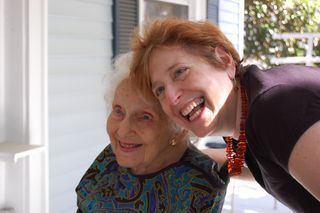
If you are in and out of the lives of the extreme elderly, and those who care for them, you grasp very quickly that the relationship between elder and caregiver is the determining factor when it comes to ease or its opposite. That night, Aunt Dot's regular and much-loved caregiver, Zorina, was off. A replacement aide, found by the agency, was there. I'd never seen her before and wouldn't again.
This aide was clearly competent in the physical sense: Aunt Dot was safe, well-dressed, not alone. But, the aide also had no real clue as to who Dot was and had once been, and no interest in finding out. To her, Aunt Dot was a generic, out-of-it old person, whom she would cross paths with probably once or twice, for a few days. With no affection for, connection to, or understanding of Dot, as an individual, how could and why should she possibly connect or engage? And she made no attempt to do so: that night when I came in she was sitting across the room near the window, facing away from my aunt, flipping through a US Weekly.
Understandable and unavoidable, I guess, at least sometimes, though this kind of custodial care may be, it's one of the daily tragedies in the lives of the very old.
"Aunt Dot," I said, "What's wrong?"
She looked at me and said, very crossly, "I don't know who I am, I don't know where I am, and I don't have the slightest idea why I'm here."
I took off my coat, hanging it over the cast iron half-railing that served to divide part of the living room from the front door, making a quasi-hallway. I squatted down on the floor next to her. She looked at me with interest, though no particular recognition that I could tell.
"Well, Aunt Dot," I said, sitting next to her on the wall-to-wall carpet --- also turqouise blue --- which had seen better days, "Let me tell you what I remember about you, and let's see if that makes any difference."
I told her I was her niece, daughter of her sister Charlotte. I told her she was Dorothy Arnof, that she had been married to Joe Arnof and that, after Joe died, she had lived for a long time with her boyfriend Jim Cherry. I told her she had been a textbook editor at Macmillan's for many years. I told her she had traveled all over the world with Joe when she was young. I told her she used to love reading murder mysteries. I told her she had once taken me to Disneyland, and that we had ridden on an Alice in Wonderland ride, where the cars were shaped like giant tea-cups. I told her she had owned a home in Vermont, and spent many summers there, and that I lived there now.
She listened attentively, and her agitation fell away. She looked at me with great interest, but without comment. Though at other times when I'd reiterated her life-history to her, she would ask me question after question ( "Was I married?" "Did I have any children?" "How did I make my money?" "Was I good-looking?"), this night, she was quiet.
The relief caregiver, utterly outside our circle, turned over pages.
But Aunt Dot was visibly calming, becoming happier as I told her about herself and our life together. A faint amused smile came and went around the edges of her lips. Those blue eyes, about which she had been so understandably vain, were bright and engaged.
But suddenly she did speak.
She was looking across the room, at the low coffee table in front of the fireplace. It was stacked with magazines and photographs and mail and the small knick-knacks that had been there forever (reproductions of ancient Egyptian cats from the Metropolitan Museum of Art's gift shop, a small inlaid box of colored stone brought back from Greece or Turkey as a souvenir… she had traveled the world with her by-then-long-dead husband, an importer of what were then called 'curios'. Even after his death, she continued to adore traveling. Her favorite trip, which she had often talked about, was a Smithsonian tour to Turkey, where she worked on archeological dig. She was in her late 60's or early 70's then.)
Among all the coffee table detritus was a bouquet of flowers in a basket. The bouquet had probably been there since her birthday three months before. It was completely dried up, and brown.
"Those flowers," said Aunt Dot, out of the blue, very decisively, "are dead."
I looked over at them. "You're right, Aunt Dot, they are very dead," I said. "Would you like me to throw them out?"
She said, "Yes!" with that same decisiveness. It must have served her well during her fifty years as an editor, and then editorial director, at Macmillan's.
I stood, walked across the room, picked up the basket of dead flowers, and carried them to the garbage can in the small kitchen. I pushed them in; it took some shoving. I came back to sit next to her again.
"Is that better?"
"Yes!"
"Would you like me to get you some new flowers?"
"Yes!"
"What color flowers?"
An imperial wave of the hand. "All colors," she said.
"Okay," I said. I got up, put on my coat, and left the apartment.
On the way down in the elevator, lined with dark polished wood, equipped with padded leather bench and operated by a uniformed elevator man, an elevator in which I had ridden since I was an infant in my mother's arms, here's what I was thinking, "Food Emporium, please, have flowers, have flowers."
The Food Emporium being the supermarket right around the corner from Dot's. A quick run out on a Sunday night in New York? Where else was I going to get flowers?
Food Emporium, on 1st, did not let me down. Their mixed bouquets, a little the worse for wear but still presentable, and certainly far more alive than the flowers I'd disposed of, would have to do. I chose one of the cellophane-wrapped bouquets, paid for it, stood at the light, crossed, and reentered "410", as my mother and I always referred to Dot's building. Total elapsed time, maybe 6 minutes.
My aunt, in addition to her professional Macmillan letterhead, also had both casual and formal engraved stationary with her home addresses, both in New York City and in Vermont. Her casual notecards, later in life, were yellow, with red decorative print and flourishes, the words "Deductions from Dorothy" on the top. I received more than one "Deductions from Dorothy" letter from her.
My aunt, who'd been as bright as those notecards when I'd left, had not lost her alertness in the few minutes I'd been gone. I was so glad to see this. She was sitting up, still with-it, seemingly expectant. Though the disengaged caregiver could almost not have been there, Dot definitely was.
"Here are your flowers, Aunt Dot."
"Nice."
"Would you like me to put them in a vase?"
"Yes!"
Back in the kitchen, I rustled off the cone of cellophane and went to look for a vase. Having visited her in that apartment all my life, I knew in which closet, off the narrow, bookshelf-lined hall that led to her bedroom, they'd be. I knew they'd be to the right of the table-linens, above the wrapping paper, below the towels. I found a vase; this one more aqua than her typical turquoise. I returned to the kitchen, rinsed it off, filled it with water, inserted the bouquet, and brought it back, putting it on the small table next to Aunt Dot.
"What are they?" she asked.
"Flowers," I said.
" I know that," she said impatiently, "But what are they called?"
"You mean, what kind of flowers are they?"
"Yes."
And so I began. "Well, this white one is a chrysanthemum, the big kind they used to call football mums. Maybe Jim Cherry might have brought you one when he picked you up at Wellesley in the Model T to go to football games, and you both wore raccoon coats."
Dot gave a nod which I interpreted as, "Yes, go on." So I continued around the bouquet.
"And these are alstroemeria, some people call them Persian lilies, they keep for a long time. There are two pink ones in this bouquet, and one yellow one."
Another "go on" nod.
"These frilly ones over here, white with those tiny red lines, they're carnations."
Aunt Dot then pointed to the one huge bloom which clearly dominated the bouquet.
"And what, " she said, pointing, "Is this pretty thing?"
"Oh," I said, "That's called a sunflower, Aunt Dot."
I thought about it for a minute. "Did you know, Aunt Dot, when sunflowers are growing in a garden, their flower-heads follow the sun?"
I stood up and began to demonstrate for her, turning my face and head illustratively as I spoke, as I might tell a story to a little girl. "In the morning, the sunflower faces towards the east, where the sun rises. " I turned my face to the right. "At noon, the sunflower turns itself straight up overhead, to where the sun is. " I gazed up at the coffered white ceiling, a little dingy; God knows when it had last been painted. "And when the sun goes down in the late afternoon, the sunflower turns to the West." And I turned my head to the left.
Aunt Dot watched this performance closely.
And then she said, with extreme skepticism,"Have you personally observed this?"

I now live, as I said, in what was Aunt Dot's summer home, in Vermont. I am a passionate amateur gardener. In the summer of 2009 I grew an ornamental annual sold as "Mexican sunflower." It was pretty --- orange petals, yellow and brown centers --- and about 3 or 4 feet high. But it was not at all what I picture when I think "sunflower."
In January, 2010, Aunt Dot, by then having lived to 100 years and nine months, died.
Her feet were growing gangrenous from lack of circulation; it was important that she leave this world before she was put into a hospital and the system --- which would have begun by amputating her feet --- could get hold of her. Her doctor told me as much, saying, "What am I going to do about your aunt?"
I asked him not to hospitalize her. I got hospice in. By then she was unconscious, but would stir every four hours or so, when the painkillers wore off. When they wore off and Dorothy would awaken, moaning, the caregiver --- by now a lovely woman, Dita, who had been a doctor in Romania --- would adminster the medicine and offer her food or beverage.
Aunt Dot fought fiercely against so much as a swallow, turning her head angrily. The second or third time it happened, Dita turned to me. "Do you want me to stop trying to feed her? Unless she asks for food, or shows us she wants it in some way? "
I knew what she was asking me.
I thought of the friend, ironically a chef and fellow cookbook author, who had told me that when she stopped forcing her dying father to eat, he had stopped needing painkillers, and a kind of high, she said, kicked in. At the time I thought, "Yeah, right. That's some nice fairytale to tell yourself."
But now, I said to Dita, "Yes. Yes. "
Dita turned and left the room with the spoon and the small can of Ensure she'd been trying to put into Dot. I remember noting the Ensure's flavor, "Chai Latte."
I stayed with Dot. And that was the point --- that final round of pain medicine, that last spit-away, resisted spoonful of Chai Latte Ensure --- when she stopped waking up, moaning and in pain. Four hours later, six, twelve, she had not stirred, or moaned or cried out; the signs which we had taken to gave her painkillers. With that decision, less than 24 hours after hospice had arrived, Aunt Dot seemed to cross a border.
Yet, though now unagitated and out of pain, unconscious, calm, peaceful, she was still here.
Later that afternoon I stood beside her. When I put my hand on hers she grasped it, with astonishing strength, though seemingly without waking. "Oh," I thought, "This is what's meant by 'death grip'."
First I told her how much I loved her, and how much her sister loved her. How much Joe and Jim, and "Mom and Dad" had loved her. And her friends the Locallios. And her other friends, among them Beryl, and … there was quite a list.
Of course, I was wiping away tears with my free hand. Of course, I kept going. You do what you have to do, sometimes, because it's clear that it's needed and there's no one else to do it. You can't duck some things, not when they have your name on them. Not when they are as much priviledge as burden. Not when you understand that life, and love, and being born into a body, has a price tag which is always much greater than you imagined you could or would have to pay, and yet, which you pay willingly.
Finally I said, "Aunt Dot, I want you to know that your passport's been renewed, and it has all the visas stamped in it. Your tickets are in order. The suitcases are packed. Everything's taken care of. When you're ready to go, you can go. "
She maintained her tight grip. Her eyes remained closed, her breathing was regular. But as she heard this, or at least, as I said its, her eyebrows raised slightly, and lowered.
I said, "I'm not sure exactly where you'll be going. I don't think you'll be on an archeological dig. But you never know. I just know that when you're ready to leave for your next trip, you can."
At about 11:30 the next night, she did.
When David and I had packed up her apartment, given away much, boxed what we wanted to keep, we went over to the west side to rent a U-Haul. Standing outside the U-Haul place under a sky striated in shades of gray, the air bristling with a cold, hostile wind that blew the raindrops into something sharp and stinging, I watched David and the U-Haul guy check the van for dings. And I noticed the company slogan, painted on the side: "Where will U go next?"
I looked up at that sky and thought, "Yeah, Aunt Dot, where?"
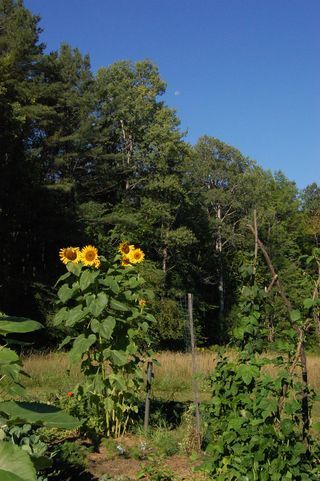
In the summer of 2010,the summer after Dot's death, I bought a package of seeds called Mammoth Sunflowers, and I planted them in the garden. With great satisfaction, I watched them get taller and taller.
Their hairy, woody stalks shot up: 4 feet, 6 feet, 12 feet. Their flowerheads, much larger than the ones in that mixed bouquet or those of the Mexican sunflowers, were almost as big as a dinner plate.
Now that, I thought, that is a sunflower!

Though I used some of the sunflowers as cut flowers, most I left standing. When they died back, the flower head was left, diamonded in the middle with seeds. Finches, jays, and chickadees came and went, feasting on them with great enthusiasm.
And all summer long, I watched the flowerheads turn, attentive to the constant revolution of the sun. A turning that never stops.

I have personally observed this.
This year's sunflowers are planted and now up, beginning their brief season on this turning earth.
May 15, 2011
"fixing to" ... and a message via indigo bunting
The original inventers of twittering have been coming and going from the feeder all day today. Whenever I look out, from the bathroom window upstairs or the french doors in the kitchen downstairs, different visitors are at the cafe. Finches yellow as canaries, finches as reddish-purple as if they'd bathed in grape juice. Sparrows, in tweedy brown-gray-black-white. Black-caped chicadees. Grosbeaks, with their rosy-red neckerchiefs set off by the chic understated black, gray, and white, the bright slash of their busy yellow beaks. All those dear active feathered bodies, at work, play, feeding, in flight.
And then, twice --- at midday and then again in the late afternoon --- a rarity at the feeder. An indigo bunting, its turquoise so vivid my breath caught in my throat. (photo, courtesy of Thundafunda)
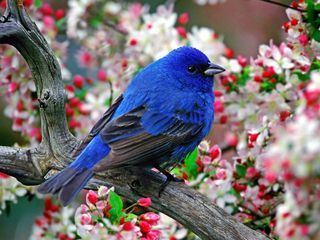
Which reminded me.
About six years ago, I was fixing to teach my first Fearless Writing in Vermont.
By the use of "fixing to" you can tell, if you didn't already know, that the majority of my life has not been spent in Vermont, but in Arkansas.
"Fixing to" has elements of "getting ready to" or "about to" , but it's more elastic, less definite. This indefiniteness has to do with time and preparation. One could be fixing to  do something in a year or in 15 minutes. And while this could involve doing a particular task in a timely manner (if you're fixing to go a potluck, for instance, you might be making a skillet of cornbread, or cutting up and transferring it to a basket), it --- fixing to --- also, to me, also implies a kind of thoughtfulness, a mental preparation or pre-preparation. You're deciding less what, than how, you'll go about whatever you're fixing to do. You're rolling it over in your mind, meditating on it, cogitating on it, considering it.(Left, one such basket I did take to a potluck, here in Westminster West, Vermont, in 2010; photo by David R. Koff.)
do something in a year or in 15 minutes. And while this could involve doing a particular task in a timely manner (if you're fixing to go a potluck, for instance, you might be making a skillet of cornbread, or cutting up and transferring it to a basket), it --- fixing to --- also, to me, also implies a kind of thoughtfulness, a mental preparation or pre-preparation. You're deciding less what, than how, you'll go about whatever you're fixing to do. You're rolling it over in your mind, meditating on it, cogitating on it, considering it.(Left, one such basket I did take to a potluck, here in Westminster West, Vermont, in 2010; photo by David R. Koff.)
The fixing to I was doing around this particular Fearless Writing had elements of both thought and action.
Not only was it the first Fearless I was going to teach in Vermont, it was going to be in my own home, not a conference center or similar facility. Not only was it going to be in my home, instead of being a quick one-weekend intensive workshop, the way I most often teach it, it was going to be one full-day Sunday every other week for six months; twelve sessions, in other words.
We would go more slowly. The group would get to know each other very well. The seasons would make a half-circle. We would change, individually and together, with and through our writing and our shared time. I knew this, though I had no idea exactly how the particular students would all mesh together with each other and with me, only that they would, in some unforseeable way.
The fixing to was given further depth by the fact that I was still fairly new to my Vermont life. It still felt like a still largely unknown after, filled with question marks --- to the before that had been Arkansas, period.
The Arkansas life: as many readers of these posts know, I'd assumed I'd have for the duration, but had been abruptly exiled from it by the sudden death of my much-loved husband, Ned Shank. His death that unspeakably large domino which knocked over almost all the others constructing my old life.
Ned's before-and-after happened within the space of four hours. BEFORE: 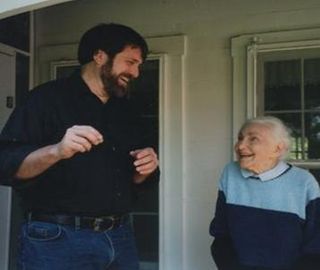 a tall, handsome blue-eyed guy in early middle age, with disgracefully long eyelashes; a writer, an artist, an innkeeper, an historic preservationist, an imperfect but loving, affectionate husband, and an all-around sweet, funny guy. Don't know who took this picture of him, laughing with my Aunt Dot on the side porch of what was then Aunt Dot's Vermont home, and is now mine... I believe it was a visit we made here in September, 2000, just a few months before his death. Now both Aunt Dot and Ned are gone from this world; but strangely, he, at age 44, before her, at age 100 + nine months. This picture always twinges me, but i love how it shows the fondness these two had for each other, their good humor in each others' company, and their relative sizes and ages.)
a tall, handsome blue-eyed guy in early middle age, with disgracefully long eyelashes; a writer, an artist, an innkeeper, an historic preservationist, an imperfect but loving, affectionate husband, and an all-around sweet, funny guy. Don't know who took this picture of him, laughing with my Aunt Dot on the side porch of what was then Aunt Dot's Vermont home, and is now mine... I believe it was a visit we made here in September, 2000, just a few months before his death. Now both Aunt Dot and Ned are gone from this world; but strangely, he, at age 44, before her, at age 100 + nine months. This picture always twinges me, but i love how it shows the fondness these two had for each other, their good humor in each others' company, and their relative sizes and ages.)
THEN --- which I guess is the "and" in every before-and-after: he, on his finch-yellow bicycle, on his tri-weekly ride, flew through a pick-up's windshield. The impact, on 62 West, just past the Lake Leatherwood turn-off; the ER doctor at St. Mary's in Rogers, Arkansas, wearing black scrubs with an incongruous pattern of bright fruit, coming into the "family room" to say to me, "We lost him."
AFTER.
My own after was not a literal death, of course. Only the death of an old life.
Call it, more accurately, an amputation. One that took place with agonizing slowness and only gradually dawning awareness. Pyschic gangrene just about had to set in before I was willing to say, "Okay, cut it off" and hobble the hell out of Dodge; which is to say, the town that had been my home for 33 years, Eureka Springs, Arkansas.
And move on to the slow, incremental creation, or perhaps revelation, or unfolding, of my new life, begun so tentatively. But one I have now been living, in Vermont, for the past eight years.
It now seems to me that in part I got through all this loss and change because writing itself had taught me a lot about uncertainty.
Showing up, working, walking and writing the same way, one foot after another, without much idea of where I was going. But somehow arriving somewhere that was often surprisingly good: despite unknown, unguaranteed, uncertain outcome, and swimming in the tidal rise and fall of anxiety with its unpredictable, lethal-feeling undertows.
Teaching Fearless Writing (a misnomer, because fear is always part of the process) had deepened my abstract and practical understanding of this. Each time I watched students get it, I got it again, too.
"It" being: that increasing one's ability to tolerate anxiety is the price of admission to writing, creativity, and finally, life itself.
This is something one never stops learning. Like all the big, important stuff, you don't learn it once, but over and over again. And each time it feels both familiar and like a shockingly new revelation.
So. There was a lot of "fixing to" as I approached this first extended Fearless Writing. 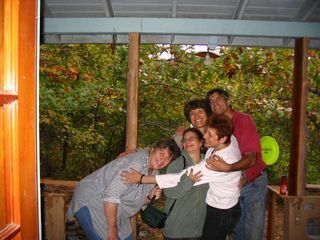 Given a death, an emotionally unclean and needlessly cruel severing from a non-profit organization I had started back in Arkansas with my late husband, the sale of one house, the purchase of another (that second house being Aunt Dot's former home, bought, as I always say, "...with financing, so creative I should have gotten a Macarthur.) Then, a cross-country move to a part of the country with so different a geographic, political, and civic climate from that in which I had lived for the prior 33 years, that I could as well have moved almost to another planet --- a lot of "fixing to." Right, the day of the great loading of the moving truck, on my then-front porch in Arkansas. I got by with a little help from my friends. Make it a LOT. Here, embracing and being embraced by Cheri Wright, Charlisa Cato, Starr Mitchell, & George West. Ah, the poignant problem of a late-in-life move: you can make new friends --- I have, and I do --- but you can never make old friends. (I believe the South is so much more easily friendly on a personal one-to-one manner than the North, yet remaining unbelievable harsh on a civic level, while the North is the exact reverse. But there are exceptions, and I digress.)
Given a death, an emotionally unclean and needlessly cruel severing from a non-profit organization I had started back in Arkansas with my late husband, the sale of one house, the purchase of another (that second house being Aunt Dot's former home, bought, as I always say, "...with financing, so creative I should have gotten a Macarthur.) Then, a cross-country move to a part of the country with so different a geographic, political, and civic climate from that in which I had lived for the prior 33 years, that I could as well have moved almost to another planet --- a lot of "fixing to." Right, the day of the great loading of the moving truck, on my then-front porch in Arkansas. I got by with a little help from my friends. Make it a LOT. Here, embracing and being embraced by Cheri Wright, Charlisa Cato, Starr Mitchell, & George West. Ah, the poignant problem of a late-in-life move: you can make new friends --- I have, and I do --- but you can never make old friends. (I believe the South is so much more easily friendly on a personal one-to-one manner than the North, yet remaining unbelievable harsh on a civic level, while the North is the exact reverse. But there are exceptions, and I digress.)
But I had done most of the fixing to by this particular Saturday, before the first Sunday of this extended Vermont Fearless Writing. And I was surprised to be... happy.
It was early May, as it is on the day I write this: miracle greeness after the long cold white winter. The one after which I gave that extended Fearless must've been my second or third in Vermont; now I have been through eight, to my own astonistment.
Non-New Englanders always imagine winter to be the biggest climactic challenge; this is not so. It's Mud Season, which follows winter: incredibly inconvenient, mussy, muddy, mucky, unwalkable, undrivable, sloppy.
But then. Spring.
Now --- both as I write this and the "now" of the day before I taught that first Vermont Fearless --- the white snow and wet brown mud had retreated. Almost everything was green or becoming so, a green pale and yellow-tinged, as if trees and grass, so long covered and sodden, now thirsted for and feasted on sunlight to excess, imitating it, exuding it. A greeness omnipresent, almost palpable, and impossible for human eyes to get enough of.
And me? That day I too was beginning to green-up and grow golden, in a new, double-barreled way. First, I was filled with anticipation about the class, jazzed, psyched. Second, on top of that, just astonished that I had it in me to be happy again.
One does not understand life's own hunger to live, quite apart from individual will, and the resilience it brings, until one has experienced it. While for several years after Ned's death, my own life felt to me like a long prison sentence, a non-negotiable term that is served with grim endurance, because it must be, that resilience was there, as improbably alive beneath the inner snow and cold mud as is spring beneath the outer.
That Saturday, I was cleaning the house. ("Thank God we have people over," Ned used to say, cheerfully, running the vacuum, "Otherwise the house would never get cleaned!"). David, my present and, in so far as I can see, for-the-duration partner, did not yet live here full-time. So that day it was just me and the two brother-and-sister tabby cats, asleep in the room we use for work-outs and DVD-watching.
Like everyone in Vermont, we "zone" the house in wintertime, so as not to heat the whole tresidence, only the parts we're using at any given time. The room where the cats were asleep, and the guest room next to it, have no central heat. Instead, there's my old Ashley Automatic woodstove, which I brought all the way from Arkansas. In the winter, when David and I want to watch a movie of an evening in that frigid room, we crank the Ashley up, and pretty soon it's cozily tropical in there.
In addition to the Ashley, the house has two fireplaces, one in the living room (where Fearless would be held) and one in the dining room. Counterintuitively, we shut the damper of the fireplaces in winter and do not use them; more heat gets sucked up the chimney than even a blazing fire puts out into the room.
But in spring, when the days are pleasant and somewhere on the medium to warm continuum, but the nights still nippy usually well into May, ah, those fireplaces, and the fires we light in them, are perfect.
As part of my clean-up, I swept the fireplace free of ashes, and began laying a fire. I am a great and devoted fire-builder. It's kind of a Zen thing. The way each fire goes together slightly differently, because the exact pieces of wood vary. It takes being very particular in stacking, layering kindling, selecting and placing just the right branch or log in just the right order and position. I should be good at this, and I am; wood was our sole source of heat all those years in Arkansas. But beyond all the shoulds, I love building a fire. And then lighting it. And then, watching as it catches, mesmerized --- as humans have been since prehistoric times ---made happy and warm by the flames.
That Saturday, I saw that one particular log was a little short for the fireplace. "Oh," I thought, "I might as well lay a fire in the woodstove too, while I'm at it." The short log would be perfect for the woodstove, and so I carried it in there and lay it on the hearth.
I heard a small unusual thump which I couldn't identify as I came in the room with the woodstove. The cats, utterly sacked out on the orange couch, did not stir. I opened the woodstove and there was another sound, and a small puff of ash floated out. Cautiously, I leaned over and peered into the woodstove.
And there, at the far end of the oval shaped stove, was an indigo bunting cringing among the ashes, its feathers slightly puffed. I heard myself say out loud, "Oh, I know we can do better than that for you, " and I closed the woodstove door.
First I got the cats (drugged with sleep, oblivious to the indigo bunting) out of the room, carting them upstairs and shutting them in the bedroom. Then, I went to the kitchen and got a rag. I even remember the rag: blue flannel, with small white fleur de lis on it. The rag had once been a sheet, in use at the inn my husband and I had owned back in our Arkansas life. When it had gotten too ratty for the inn, we had used it on our own bed. Finally, it became rags. It is strange, what lasts and what doesn't.
With one of those rags, I returned to the woodstove, opened the door and yes, there was the indigo bunting. I imagine it must have been terrified, but what human knows, really, what a bird feels? But it was crouched in that far corner still, its feathers dulled with ash, its head tipping one way and then the other, its eyes still bright, alert, very wary.
I reached in and tossed the rag over the bunting, and, just like that, reached in and carefully picked up the rag from below, the back of my hand in the ashes, the bird inside. I carefully carried the small rag-wrapped bundle out to the lawn on my palm, hoping deeply that the bird inside was in no way injured. But expecting, I think, that it would be a little dazed.
There, in the sunlight, I lifted off the rag. And that tiny bright blue bird was not in the least hurt, or dazed. Instead, liberated from stove, rag, and human hand, it simply and immediately flew away and up.
"Took flight" makes it sound more dramatic than it was; there was no burst of feathers or sudden flapping of wings, as if it was in fear. It was wholly natural. I'm here, I'm gone. Just up and off. I followed its its blue with my eyes, up and to the maple tree by the stone wall. I watched until it flew away again, on whatever errands were on its things-to-do list.
Brilliant indigo bunting, trapped in a dark cavernous place filled with ash; then, liberated, back to air, sun, flight, its own nature.
That day, could my life, my starting-to-be-new life, have felt to me any more like that bird's? And my students, who would come at noon on the following day --- would I be helping them open a door to some cast-iron place, so that some imprisoned part of themselves might flutter out and back into its own nature?
Do we not each have, and need, a dark place? Maybe it's a prison; maybe it's a stove. It can trap us, warm us, burn us; it can, if we are a small blue bird and it's May and we perhaps tried to make a nest in what seemed like a good place but turned out to be the stovepipe of a then unused stove, keep us cold, isolated, and in ash and shadow.
As humans, we need containers in which to create warmth. But we, no more than that indigo bunting, are not meant to live imprisoned, in a woodstove or anywhere else.
I can still remember the names of every person who attended that long class, which ran from the longest days of the year through the shortening fall and early winter. I can see the faces in my mind, where each person sat, the sunny day we met inside and just outside the opened french doors on the lawn facing the garden. The breaks where we ate, or sometimes ran down to the pond for a quick, chill dip. I can recall some of what everyone wrote, read aloud, said, and how often they surprised themselves and me and the class.
The one who said, at the beginning "I want to write, but I'm afraid I'll be revealed as a phony." "To whom?" I asked. He blinked in astonishment, as if this was self-evident. "To myself, of course."
The one who said "I wish that every time I start to write, all of these negative thoughts wouldn't rise up in me." "Define 'negative'," I said. "Oh..." she said, pausing. And then, wonderfully, "Introspection gone ballistic." (Something I quote occasionally, with attribution to her, in Fearless workshops to this day.)
The one --- a lef-wing management consultant to non-profits --- who discovered, in some of our practices, that some of what he was writing might be poetry, and that he could write sympathetically as an out-of-his-depth George Bush. Discovered that he could write with transparent brutality about a well-meaning conversation in a restaurant with his young daughter, in which he tried to explain the divorce from her mother.
I looked at that indigo bunting today and remembered all that. It happens to be a challenging time in my life and David's right now. My mother is 95. My brother and I disagree about her care. David, his mother, and his brother mirror, in a fun-house sort of way, that same sibling/eldercare dynamic at play in his family. He has issues with his old life, and property he still owns in it. Time is doing its relentless tick-tick-tick number, asking us both at every moment, "Is this really what you want to be doing with me? I'm infinite only to myself, you know, not to you, you mere mortal." The industry with which I've been connected my whole working life --- publishing --- is undergoing tectonic changes due to various forms of online publication, all of which affect my financial life and future and demand new responses and decisions from me. Risk and uncertainty at every turn. Anxiety's causes are always current, yet it is also, again always, the same-old same-old.
And yet. And yet. Sometimes the door of the dark prison opens, and, with as much seeming randomness as one was got in there, one is suddenly free. Free, if one is an indigo bunting, even of the memory of ash.
And free, if one is a human writer, to remember and recall both entrapment and freedom, to consider them both part of the "riot of opposites" as the Gita puts it, the tidal turning that is life. Free to use the happenings, the mishaps, the happinesses, the mysteries in creating narratives with which we can live. Experience and its utility: the same old ticket to whatever is next, beginning and ending with the creative invention and reinvention of meaning. For nothing is wasted on us, we writers, and in that, we find our greatest luck and purpose.
Crescent Dragonwagon's Blog
- Crescent Dragonwagon's profile
- 69 followers



